




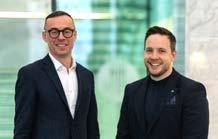
Foreword
Rob Heron and Gareth Kelly
(L-R) Managing Partner and Partner in Analytics and AI from EY Northern Ireland
In a strategic move aimed at transforming our organisation’s capability, we at EY NI recently announced plans to add 1,000 new jobs to the region over the next five years. This substantial expansion is set to increase our local headcount to 2,000, marking a significant milestone in our commitment to Northern Ireland and its thriving technology and professional services sectors as a whole.
We believe passionately in the region’s diverse talent pool, grown not only from Belfast but from right across Northern Ireland. Our new hub in the Northwest will play a key role in our growth plans and cement our presence here as one of the leading providers of business services in the areas of AI, emerging technologies, data & analytics, as well as our more traditional areas of expertise in assurance, tax, consulting, and corporate transactions. Our aim is to expand our traditional services and push the realms of possibility with a focus on innovation, leveraging the best talent, the latest technology and a clear focus on delivering value for our clients. At EY you can live and work locally, but experience globally.
The 1,000 new jobs provide opportunities for all and will attract a wide-reaching demographic of people from all backgrounds, capabilities and ambitions. Our aim is to recruit beyond the ready-made skilled talent pool in NI and make substantial investments to train and reskill a new generation of capabilities. Our aim is to address underemployment and work with talent who have been out of the workforce for extended periods, school leavers, recent graduates, and people who want a change of career.
These opportunities are particularly exciting given the strength of the Northern Ireland region as a leader in technology. NI has established itself as a world-leading location in tech and has become a thriving technology hub over the last decade. Northern Ireland is home to some of the most talented and skilled professionals in Europe,
partly due to its large younger population of digital natives as well as the close proximity to top schools and universities, including Queen’s University Belfast and the University of Ulster, with campuses across Belfast and the Northwest.
We want to encourage this top technology talent to stay here in Northern Ireland and entice some of our lost talent, who have moved elsewhere, back to the region. We also aim to encourage international talent to be part of the ever-growing local ecosystem. We believe these new roles, as well as the exciting work we are doing for our clients across Technology Consulting, Data, Analytics and AI, will create huge opportunities for long and successful careers in NI.
One-third of the 1,000 new roles will come through the Assured Skills Academy Programme. We will provide the best possible training and opportunities while considering core values such as diversity and social impact. The participants of our first Assured Skills Academy Programme, in partnership with Belfast Met, have recently graduated and joined EY Northern Ireland as Data, Analytics & AI Consultants. We have been so impressed with the quality and diversity of this cohort. Some of our new joiners relocated from other parts of the UK, some were unemployed or underemployed, and some have completely changed careers, including a former law lecturer. This diversity is key to our success and a critical factor in our ability to scale and build the best team possible.
This expansion, with its substantial economic impact and global opportunities, stands as a testament to EY's dedication to both its clients and the local community. Our vision, ‘building a better working world’, is at the core of what we do as a firm and in NI, that means developing solutions that help clients deliver better outcomes, investing in our people, and contributing to the communities in which we live and work.
About Sync NI
Sync NI is proud to be the voice of Northern Ireland’s vibrant technology and business sector.
The Sync NI website and magazine brings readers the latest tech and business news, views, jobs and events in Belfast and beyond.
Sync NI Contacts
Editorial
Phone: 028 9082 0947
Email: team@syncni.com
Advertising & Partnerships
Phone: 028 9082 0947
Email: louis@syncni.com
General Enquiries
Sync NI
Rochester Building
28 Adelaide street
Belfast
BT2 8GD
Phone: 028 9082 0947
Email: team@syncni.com
Online: www.syncni.com
Copyright
No part of this publication may be reproduced without the written permission of the copyholder and publisher. Sync NI accepts no responsibility for the accuracy of contributed articles or statements appearing in this magazine and any views or opinions expressed are not necessarily those of Sync NI, unless otherwise indicated. No responsibility for loss or distress associated to any person acting or refraining from acting as a result of the material in this magazine can be accepted by the authors, contributors, editors or publishers. Sync NI does not endorse any goods or services advertised, nor any claims or representations made in any advertisement in this magazine.
EY: Navigating your unique job journey
Women in Business: How women in tech can fast-track their careers
Inspiring the next generation of young women leaders at Queen’s University Belfast
PA Consulting: Taking the leap to change your career
Climbing the ladder with Apex Fintech Solutions
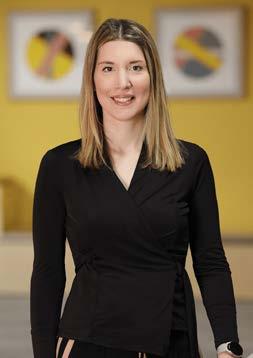

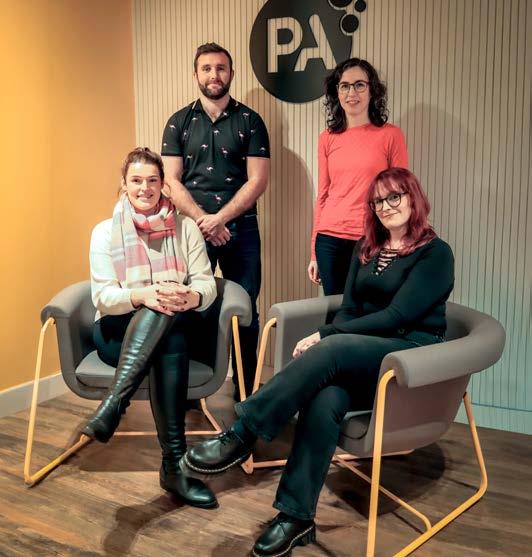
Q&A with Danielle Topping, Lead Software Engineer at Rapid7
Rapid7: Skills, education and tech careers
Q&A with Susan McCambridge, Economic Development Manager at Belfast Metropolitan College
ESO Belfast: Nurturing diverse tech talent for the future of emergency services


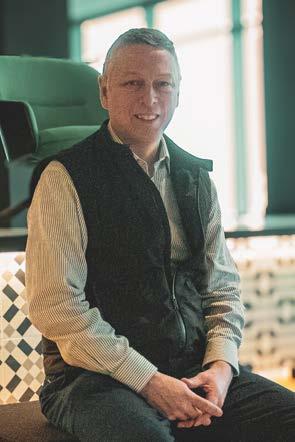
A conversation with some of Northern Ireland’s female leaders in tech
Are women’s mental models preventing them from being open to a career in tech?
Kickstart your career in tech with Liberty IT
Deloitte invest in local talent with Skills Academies, apprenticeships and a diverse workforce 34
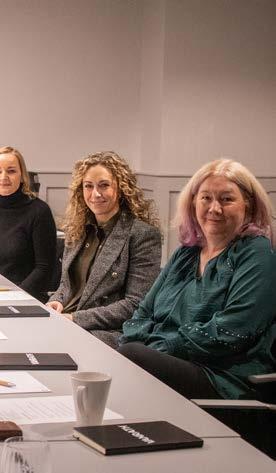

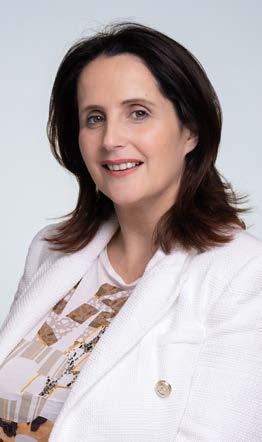
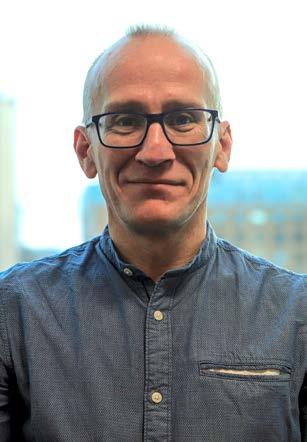
Vanrath: Forging a successful career in tech
A Day in the Life at CME
The Software Alliance: Beyond the Impact - Preparing kids to build the AI revolution, not just survive It
Workplus: Inflection point - A seismic shift required in our perception of work and education

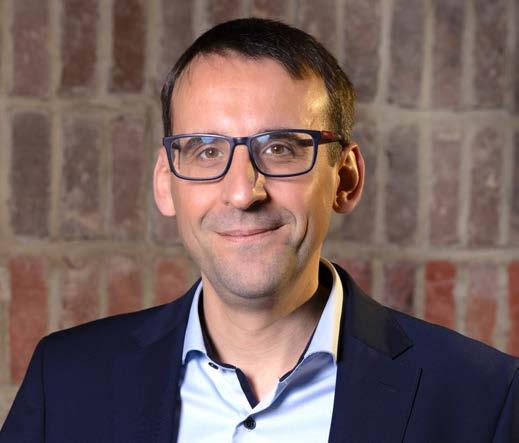
EY’s Marianna Imprialou expresses the importance of work-life balance and how success looks different for everyone
q For people who haven't considered a career in tech, what advice would you give them in terms of how to start that journey? What advice would you give to help them along their journey to achieve their career goals? The first thing is to understand what excites you and what interests you. I think that if you feel passionate about something, that’s a safe way of knowing that it is right for you.
A career in tech can be a much broader set of roles than you might think. For most of us who moved into tech, there is no big bang moment of life pre and post tech career. It’s a more gradual process. Over a number of years, you add an extra skill or an extra responsibility and without even realising, you end up doing a job that is in tech!
q Once you're working in the tech industry, how do you know if you're in the right role?
First of all, you have to consider whether you feel content. And by content, I mean, not content only with your work, but with your life as a whole. So you are not getting totally stressed out at home, or are unable to deal with other things because of your job. That's a big criteria for me.
The other thing is identifying when you feel useful. That's something that drives me: the more useful I feel the more I'm able to contribute towards a goal, and the more I know that this is the right role for me.
Finally, if a role includes elements that interest you, it's much more likely to be the right thing.
q What would your advice be to someone who feels that they're actually on the wrong path? How would they reset?
This is the hardest moment in someone's professional life. I think that all professionals will experience it at least once, so don't panic if it happens to you.
Sometimes people can confuse stretching or challenging moments with dissatisfaction in their career. When we are not expecting something to be challenging, we might feel that we are on the wrong path just because we feel uncomfortable. If the feeling persists, check with people who are by your side for their perspective. If you're extremely stressed or you're not happy, then definitely try to change this as soon as possible. Be aware that changing itself can be painful, so it might become harder for a while before it gets easier.


q Is there a simple way to define what success means in your career?
I think success means something totally different for each and every individual. It's a totally fluid state. Success in vague terms would be to be able to say that you're doing the best that you can without compromising your mental or physical health, while being a well-functioning individual outside of work. If you manage this, then irrespective of role, level or salary, I would consider this to be success. But that's just my definition, someone else’s may be totally different.
q In terms of advice, mentoring, and guidance, what are the best approaches to make sure you're getting the best advice you possibly can?
The most important thing with mentoring is to do it as naturally as possible. Not everyone needs a mentor at all stages of their career and their lives. Sometimes it’s ok for things to roll a little bit more freely, especially for junior individuals who get some support and guidance from more senior people as a matter of course. I have seen relationships which have formed naturally ending up becoming very successful mentoring relationships.
Mentoring has definitely played an important role in my life and career, and I have been blessed by people who helped me with my career development. But not everyone constantly needs this sort of relationship and I don't want people to think that there is anything wrong if they don’t have a mentor in their lives.
q What about networking? Can it be overestimated, how important it is?
Networking is a window to the outside world. It’s the only way to upskill yourself, to understand what other people are doing and what you need to learn. No reading, social media or studying can replace it. Because we are humans and we naturally need the connection, it supports our careers and our lives beyond professional success. It helps us as individuals when we connect with people to share problems and realise that so many others have the same worries and issues we do.
Networking helps you get out there which is
something that many people struggle with early in their tech careers. It can be a great way to promote your work without having to build a huge following on social media, for example. It’s also a great way to find and secure friendships. Even if you don't get somewhere professionally, it’s a win-win because you will have some good friends to show for it.
q What would you say to someone who is frightened of applying for a new role if they feel they may not have the skills? How would they go about solving that problem?
Skills development can be organised and planned, or it can be a bit more natural. I think that a mixture of both approaches is most effective. I have benefited from formal training and learning different skills, especially in my field where everything changes all the time. But sometimes, on the job training and learning has a different kind of impact. There’s almost a magic in how quickly people can develop when they need to apply those skills in order to achieve something. In EY, we really endorse this type of on the job learning as it can be faster and more targeted.
I find that people might struggle with confidence in this area. At some point they need to acknowledge that while they may not be fully qualified for something, they may have all the underpinning fundamental skills, such as problem solving, effective communication, work ethic, determination. The people who have this mentality will develop more skills more quickly because they grasp the opportunity when it arises. So don't wait until you're fully formally trained and qualified for something, take the leap now.
q Are there any free resources out there that you would recommend for skills development?
What I would recommend is not a specific approach or platform, but a mentality. People have a level of anxiety about skills development and sometimes end up doing lots of online courses, but what they are missing is application. I recommend that people start thinking about more real-world examples, for example, how can a skill be applied rather than just the theory of something. It’s more difficult to do, but it pays off.
As the fastestgrowing region in the UK, Northern Ireland tops the tech rankings as an international destination for software development, fintech and cyber security. On our doorstep, we have a diverse talent pool of innovators who have collectively brought the local industry forward in leaps and bounds.
Indeed, the number of highly-skilled women who make up this cohort is impressive – inspiring, really – but that number should be much, much higher.
Recent figures from the Office of National Statistics (ONS) have revealed a disappointing decline in the number of women working in the tech sector during Q2 2023, with economic instabilities cited as the main factor.
I cannot overestimate enough the need to turn the tide. We must actively support women in the sector and help unlock a suite of skills and experience that can truly take it to the next level, fuelling the engine of the NI economy. For that we need a holistic approach, addressing the issue on several fronts – within our schools and third-level education, but also as a

pressing priority on the Executive agenda.
What is important to highlight is that many industry jobs are not tech roles, per se; they may fall into the fields of research or product or client representatives. This means you don’t need to have a tech background to forge a successful career in tech. What we’ve seen is an upward trend in women changing careers in favour of tech roles, particularly those returning to work.
It's a career option that can be both flexible and fulfilling, and it’s by inspiring the women of today that we can impact the tech industry of tomorrow.
Our annual Women in Tech conference returned earlier this month to do just that. Working in collaboration with many of NI’s leading tech companies, the 7th
conference placed a laser focus on ‘Inspiring Giant Ambition, Fostering Talent and Igniting Innovation’.
On the day, guests heard from a range of keynote speakers who shared their own journeys into tech, including Maria Diffley, Co-founder of Sustain IQ. Maria didn’t have a tech background but recognised the need for a solution which helped companies to navigate the complexities involved in measuring, monitoring and reporting on their Sustainability and ESG investments. Maria is now growing a successful tech firm addressing a global challenge.
When we recognise and celebrate these achievements, we empower women within the tech arena to achieve greatness. Come May, our annual Women in Tech Awards will showcase the landmark
success of women across NI’s tech sector. Too often at award ceremonies I see few women represented, which is why these Awards provide a unique opportunity to nominate and celebrate women at all stages of their careers across the sector –from apprentices to C-suite leaders.
Of course, none of this would be possible without on-the-ground support, which is why I’m passionate about our mentoring programme delivered through the Centre of Learning. There’s also the Press Refresh programme, delivered in partnership with Belfast Met, to support women returning to the workforce. It’s a crucial first step for women keen to retrain and reboot their careers.
On a big-picture scale, we are also working with the Department for the Economy’s Women in STEM committee, helping to shape the very policies that will open doors for more women entering the industry.
All told, there is a lot still to be achieved. However, with a holistic approach deeprooted in collaboration, we can ensure NI’s tech industry remains on the fast track with women leading from the front.

In January 2024, Queen’s University Belfast welcomed 275 year 13 pupils from schools across Northern Ireland through its doors for a one-day leadership event, as part of this year’s SistersIN programme
The SisterNI programme, which began in 2018, aims to enable, empower and develop female pupils to become the leaders of tomorrow through helping them build their confidence and skills. Queen's University is one of SistersIN's foundation partners who are helping students develop the leadership skills needed to succeed in tomorrow's workplace.
The event aimed to inspire sixth-form girls by engaging with academic leaders at Queen’s and encouraging pupils to discover and follow their talents. The pupils had the opportunity to explore the different pathways and how they could shape their future careers.
As a foundation partner of SistersIN, Queen’s hosted the one-day event that explored topics such as artificial intelligence, the built environment, developing dynamic teams and an interactive session about the merits of box office hit Barbie the Movie as an empowerment tool for girls.
The pupils then visited various schools and faculties to find out more about the range of opportunities at Queen’s and
the various career paths open to them. Which included visits to:
q The School of Biological Sciences to hear more about how studying proteins can help identify and develop novel treatments for different types of cancer.
q Queen’s Film Theatre where staff from the Seamus Heaney Centre spoke to the pupils about storytelling and creative writing, and the potential career paths these may lead to.
q The Brian Friel Theatre to hear more about careers in performing and creative arts.
q The Kn Cheung Sk Chin Intersim Centre for an immersive experience in the University’s state-of-the-art healthcare simulation centre and how real-world skills can be gained in a guided environment.
The event concluded with the formal endorsement of the SistersIN Leadership Programme by the William J. Clinton Leadership Institute at Queen’s.
Welcoming the pupils through Queen’s doors, Professor Karen Morrison, Dean of Education in the Faculty of Medicine, Health and Life Sciences, and SistersIN Board member said: “We are delighted to be hosting this one-day event on campus and to be meeting this fantastic
cohort of young women from across Northern Ireland who have come along to be inspired, and inspire us, as they consider how they could best use their skills, talents and passions in their future careers.
“As a SistersIN foundation partner, Queen’s University Belfast firmly believes in the importance of a leadership programme like this, and in events such as today, which can inspire and encourage girls and young women into successful and fulfilling leadership roles in their futures."
Speaking after the event, Peter Dobbin, Principal of Assumption Grammar School and Chair of SistersIN, said: “Today has been an outstanding and inspirational event for some 300 SistersIN participants from 25 schools. The sessions from the academic staff at Queen’s were expertly delivered and so enjoyable for the girls on their leadership journey. Thank you again to Queen’s for hosting today's SistersINspire event, it was truly inspirational”.
To find out more about studying at Queen’s, visit www.qub.ac.uk/Study/ and more information on our Careers Service can be found www.qub.ac.uk/directorates/sgc/careers/
Kathryn Jauzion , Michelle Kennedy , Chris McNeill and Rebecca Drummond offer their insight into making the switch to a new industry, and their experience of how PA Consulting assisted their transition
q Can you tell me a bit about your career journey up to this point, and how you ended up working at PA Consulting?

Kathryn Jauzion Software Engineer
My first career was as a teacher of Mathematics for four years, and I then worked as an Internal Auditor for five years. It was during that time that I started to miss the more technical side of work, so I began to research different possibilities for a career change. I came across a Masters conversion course and thought that it might provide the challenge that I was looking for. Shortly after, I was offered a job with PA Consulting. Their ethos and values really appealed to me, and they were very flexible about hybrid working.

Michelle Kennedy Support Analyst
For just shy of a decade, I worked in the finance sector as a Senior Payroll Consultant, managing and processing multiple payrolls for medium to largescale clients. It was when I started working as a Data Support Analyst in my previous role that I realised that I love to learn, and browsing LinkedIn one day, I came across a job ad for a Support Analyst role with PA Consulting. I felt drawn to their values, sense of community and how they nurture growth.
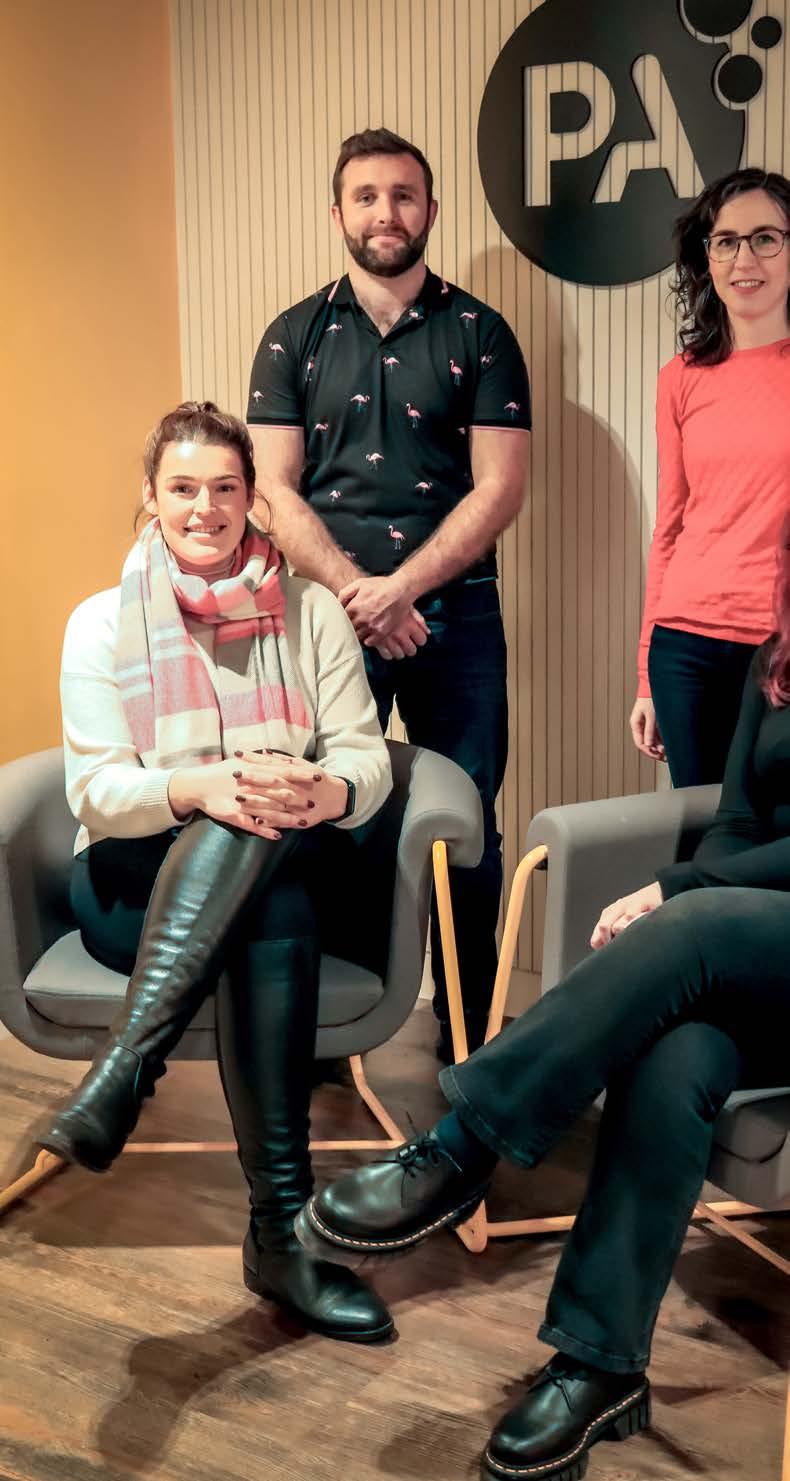


I left education at 18, with a Level 3 Qualification in Electronic Engineering, and then went to work in a large supermarket. I started part-time, imagining it would be a short-term stint, and ended up staying there for 11 years in various roles. Five years into that, I began studying Software Development, working towards a Level 5 HND. In my final class, the lecturer mentioned something called an Assured Skills programme for a tech company in Belfast, which turned out to be PA.

I left education at 18, with a Level 3 Qualification in Electronic Engineering, and then went to work in a large supermarket. I started part-time, imagining it would be a short-term stint, and ended up staying there for 11 years in various roles. Five years into that, I began studying Software Development, working towards a Level 5 HND. In my final class, the lecturer mentioned something called an Assured Skills programme for a tech company in Belfast, which turned out to be PA.
q What prompted you to make the change?
Michelle: Although I am forever grateful for the experience I gained from my previous career, I have never quite felt like it was for me. It was fast-paced and challenging, but I never truly felt fulfilled, or like I was making a valuable difference. That little voice in the back of my head kept pulling me back to the idea of working in IT, but where exactly? That was what I struggled with most –where do I fit in? What am I capable of?
Kathryn: I was seeking more of a challenge and missed using my logical problem-solving skills. I was also
looking for a career that would provide lots of job possibilities.
Chris: While I really enjoyed my job at the supermarket, there was no real career progression there that I was interested in, so I started wondering about what I could do instead. In my Electronic Engineering course, there was a Programming module which was one of the few that I genuinely enjoyed and was actually good at. I then found the HND and went from there.
Rebecca: I knew I wanted an exciting career with lots of opportunities but didn’t know how to get that or what that looked like exactly. It was happenstance I heard about the 9-week academy on the radio on my way to work one morning. I applied, got a space and then 9 weeks and an interview later I landed a job with PA Consulting!
q How have you found this industry as compared to your previous roles? Rebecca: The industry is extremely varied and diverse with a wide range of roles, client work and opportunities to find your place and make a mark. At PA I can grow and take my career as far as I want, the chance to make something of yourself is far greater than most industries and workplaces and these are all aspects that I highly value.
Michelle: Tech companies tend to be a lot more attuned and forward-thinking when it comes to work-life balance, diversity, and inclusion. Flexible working, a more informal atmosphere, and the option to work wherever is most productive for you are some major differences I’ve noticed. For me, I feel like I am accepted for who I am in this industry. I have facial piercings and coloured hair and it isn’t an issue here; but in my old industry, I couldn’t wear my piercings to work, and I usually had to keep my hair a natural colour.
To me, the IT industry tends to be a lot less focused on when, where, or how their employees do their work as long
as the job gets done well. This relaxed approach to working encourages their staff to be comfortable and promotes growth and productivity. It’s 2024, and to me, this should be a higher priority for other industries. I feel this is very important.
Kathryn: There are a wide variety of career openings and routes to go down. I am enjoying working in a technical development role, but there are so many other options available. If you find that one role doesn’t suit you then there is almost certainly another one that will be a better fit.
Chris: It’s not all sunshine and rainbows, it can definitely be stressful. However, it is much more rewarding when you achieve something, and I get a greater sense of purpose overall.
There’s plenty of variety in the career paths you can choose from. You have new experiences nearly every day and you’re always learning whether you know it or not.
q Did you find that your previous experience had prepared you for your new career in Digital?
What skills do you think were transferable?
Michelle: My past experiences have provided me with an excellent foundation to build upon and I feel better prepared for what my future holds in tech. I imagine I am much more prepared now than if I were to go straight into a tech role after leaving school when I did. Whatever your experience, it is very likely you have gained vital experience with time management, planning, communication and problem-solving that would be very beneficial to your new career in tech.
Chris: I think interacting with a variety of different people, in various scenarios, on a daily basis was a big one. At PA you can come across many different personalities and roles, especially on the client side, as you move across different
projects. So how you communicate with them and handle certain situations effectively will vary. Being adaptable to that is something that has transferred over.
Rebecca: I learnt a lot to do with digital strategy/transformation, UX/UI, user research, SEO and other aspects of social media management and data science during my masters, all the skills I learnt during this time were very helpful when moving into the digital space of a consultancy firm. I have found that the development of soft skills was particularly beneficial when faced with public speaking, giving presentations, working on slide decks etc. I think a lot of the technical aspects can be learnt on the job, but those core consultancy skills will stand to you throughout your career.
Kathryn: In many ways, my previous experience did prepare me. I had built up lots of other skills in my past roles, such as communication, presentation, and organisational skills. My jobs leading up to the career change had also exposed me to different types of professional environments, all of which helped.
q What would you advise employers who were seeking to welcome more talent from nontraditional pathways?
Chris: I would say try and make it as accessible as possible, as those going down this route probably have more constraints on their time, finances etc. They’ll also be sacrificing a lot, taking a huge risk leaving one career for an entirely new one, which can be pretty terrifying. So, you have to put assurances in place that you’re a viable option for them.
Michelle: As well as looking at someone’s experience and skills, I think it’s important to look deeper. There are a lot of people out there who may not have the traditional experience you would expect but have a powerful desire to learn and grow if given the

opportunity. They have an abundance of potential just waiting to be unlocked, and sometimes all it takes is for the right person to come along and give them a chance – Be that person.
Rebecca: I would focus on core soft skills, that are arguably more difficult to learn, with the intention of getting new joiners to do more ‘on the job’ learning. Most of us only know anything from what we learn while working on a daily basis and not what we learn from formal education. I would also note that many of us from different backgrounds may have valuable skills that we can bring across perhaps also offering a different viewpoint.
Kathryn: People who have worked in other lines of employment will bring with them a new perspective and skills that may not otherwise have been gained by following the traditional pathway.
Changing your career path is a decision that is generally not taken very lightly

and requires dedication, motivation and positive characteristics in any employee.
q If someone reading this is considering the move into a digital or tech role, what one piece of advice would you give them?
Rebecca: Ask, ask, ask! Ask questions on everything and don’t ever be ashamed or embarrassed for not understanding something. Nobody expects you to know everything and will appreciate and respect you for holding your hand up and asking for help.
Michelle: Do it - My only regret is that I didn’t take the leap sooner!
One of the most common hesitations I hear from friends and family is “I’m bad at maths/programming, so I don’t think I would be cut out for a tech role”. I think that’s one of the biggest misconceptions of tech/digital roles. You don’t have to be good at programming or great at mathematics to make it in the industry. There are a lot of roles within the industry that don’t require
either of these skills.
Whether you are a people person or prefer to work alone, a coding whizz or creative genius, a number cruncher or advice-giver, there will most definitely be a role suited to you. Tech roles are more than just Software Engineers and Support Technicians; there’s Data Analysis, Cybersecurity, Business Analysis, Cloud Engineering, IT Consultancy, UX/UI Design, Service Delivery Management and many more. I truly believe anybody can find their place in the tech industry.
Kathryn: Go for it. It has opened up so many opportunities for me, and as I mentioned previously there are a variety of roles available.
Chris: You don’t need to know everything, you most likely never will, and that’s OK. I stressed myself out when studying, and applying for jobs and in my early weeks at PA, that I had huge knowledge gaps in different areas of the development process.
If you can grasp the basic core skills, then you’re already well-equipped to deal with most things. From there you’ll continually build up your expertise and also pick up new things naturally through different experiences.
q Finally, what are your career aspirations now that you’ve made the move?
Kathryn: My aspiration is to keep learning more about development and to continue improving on my skills. I have recently been promoted to Consultant, so I am looking forward to seeing what that will bring.
Rebecca: PA has been really good to me, and with the wealth of opportunities available within the firm to progress and grow I am excited to climb the ladder with the hope of specialising in the digital transformation space.
Chris: I’m a few years in now and very happy with where I’m currently at in my own career and what I’ve achieved so far. My current career goal is just to round out my skills a little bit more. My main personal goal is to help others coming in, who are in the same position that I was a few years ago.
Michelle: Before I started my degree, I was playing about with learning how to code in my spare time and found it both challenging and rewarding. There’s nothing better than finally getting your program working after struggling with console errors for what feels like an eternity. Since then, I’ve completed a few online courses, built small scale projects for my GitHub portfolio, and even came in joint 1st place in a beginners Python course that PA and Women in Tech hosted!
As my confidence grows during my studies, I aim to make the move into a Software Engineering role in PA. I am particularly interested in AI and cybersecurity, and I’m thinking of picking one of these subjects as a module for my 2nd year.
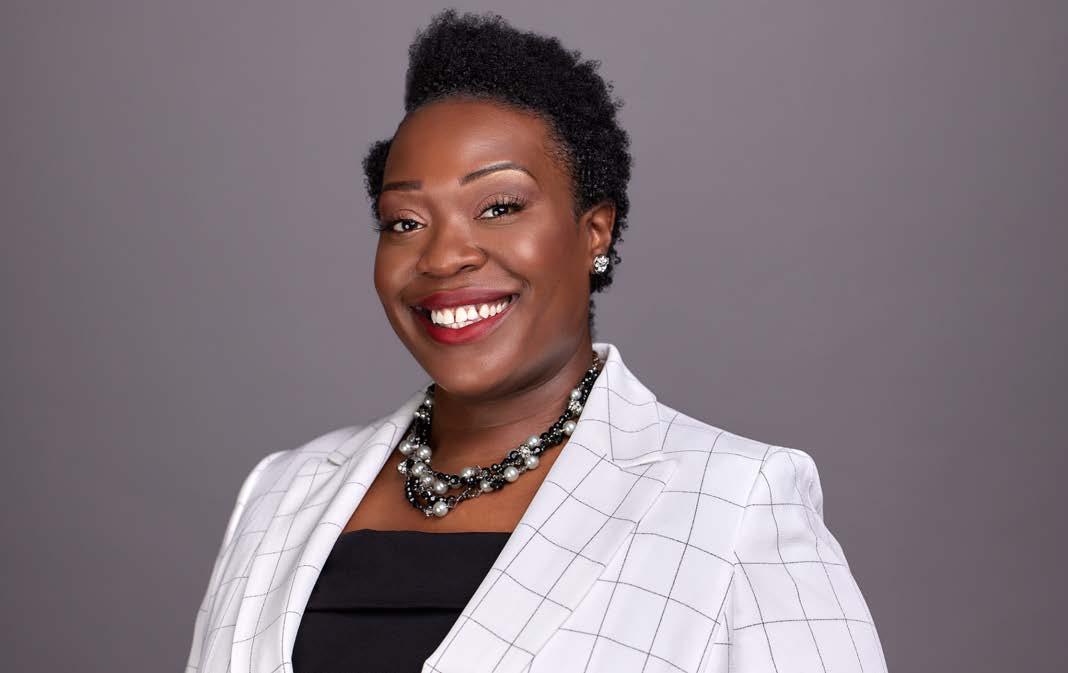
As the workforce continues to change in ways that will have a lasting impact, more employees seek jobs that will invest in their self-guided career development with opportunities to upskill through training and continuous education.
While learning and development programs are increasingly popular across many industries, many companies are not taking advantage of these highly beneficial programs. Apex Fintech Solutions has been at the forefront of the fintech revolution over the last decade. We invest in our people to ensure everyone can develop their career as they have always wanted. Our goal is to create a community of learning that focuses on building capacity in our managers, as the Harvard Business Review calls it, “Power to the Middle.” This sets them up for success to “reduce friction, accelerate action, and ensure [AFS] organisation achieves its vision.
Everyone at Apex comes from different backgrounds, education, job histories, and life experiences. Empowering employees to control their career development is crucial to successful learning. By investing in career development, we believe the return on that investment is retaining talented employees. Additionally, lowered attrition rates help drive our business forward. Decreasing the talent gap and building halflife skills is a strategy that will help us develop leaders and teams that adapt faster than ever to the ever-changing world alongside the adoption of AI.
While we offer our employees vast learning opportunities, we all start at the same place: our Apex Education Program (AEP). This comprehensive program teaches new employees everything they need to know about Apex, our products, and our crucial role in the fintech/financial services industry. The AEP is a self-paced eLearning program that provides learners
with lessons taught by our industry professionals and allows new employees to participate in various interactive elements. We have all our employees complete a DiSC assessment, a foundational tool to help you learn how to connect with others, build relationships, collaborate, gain buy-in, and navigate communication challenges. We provide a series of courses for our teams and managers alike to develop communication strategies. To continue that essential learning, we are setting up a managerial boot camp to support and develop future managers and leaders at AFS.
Our community of learning doesn’t stop there. Apex proudly offers tuition reimbursement to all fulltime employees as one of our many employee perks. Whether you want to become a certified AWS Cloud practitioner or obtain a graduate information technology degree, Apex supports those goals. We recognize that educational needs vary, so our program extends beyond traditional academic paths, catering to those seeking a professional certificate. Some of the programs that we have supported here at Apex include (but are not limited to) AWS, CompTIA A+, and Certificate of Cloud Securities Knowledge (CCSK). We work to ensure that all our employees can stay at the forefront of industry trends and advancements, so we are always open to reviewing and supporting new certification programs.
To fill in industry knowledge gaps and upskill our teams, we prepare you in your role as an engineer or business analyst by supporting other various industry-focused certifications, such as the Series 7/Securities Industry Essential (SIE) exams, which not only allow employees to trade multiple types of securities products but also build industry-leading knowledge in investment risk, taxation, equity, options, and successful client interactions.
Apex also offers opportunities for employees to complete non-certification courses through LinkedIn Learning to develop complex and essential skills that align with their goals or career opportunities. To retain interest in AI trends, we have gamified our learning. AI skills have become highly sought after in 2023, so we leveraged LinkedIn Learning to provide employees with a few curated collections to learn the basics of AI and how to leverage it to create more efficient workflows and encourage creativity. Employees could earn points of monetary value for each course they completed and even a half day of paid time off.
On top of certification and professional development programs that we support, we also offer a variety of internal career development programs. One of these programs is our Apex Leadership Development Program (ALDP). This early career program is designed for recent college
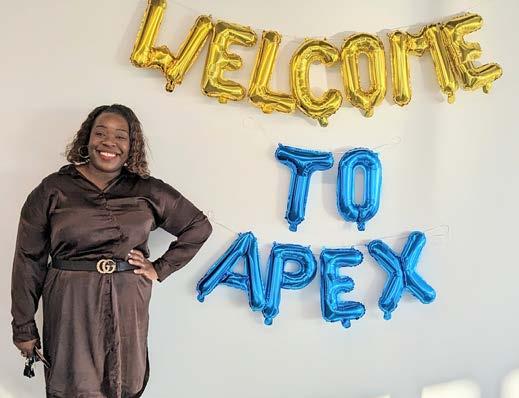
graduates with a myriad of backgrounds to participate in an 18-month crossfunctional training program that educates them on the various lines of business at Apex and other crucial skills needed to succeed in the financial services industry. The program also includes multiple continuing education opportunities where the previous year's cohort can take on a leadership opportunity as an ambassador to support the incoming cohort with curating learning for complex and essential skills that they find crucial to succeeding at Apex. The ALDP program also includes mentorship opportunities to guide, motivate, and explore career goals that will set them up for future success in the fintech/financial industry.
In the summer of 2023, we offered our first formal class of interns (or “finterns,” as we like to say). This 10-week internship program brought in college students from across the country to learn about what we do at Apex and other valuable concepts crucial to succeeding in the financial
services industry. Interns worked closely with their teams throughout the summer on various projects and tasks, providing them with the necessary handson experience that future employers desire. The internship program included a capstone project that asked interns to research and present artificial intelligence tools their teams could leverage to enhance workflows and processes.
Overall, Apex is dedicated to investing in its employees and ensuring everyone can access the proper education for them and their desired career paths. Our understanding that our employees come from diverse professional and educational backgrounds has allowed us to provide unique learning experiences that cater to all. Our culture of learning encourages employees to take control of their own education and career development plans in a way that nurtures future success. Making learning and development a priority is one of the things that allows Apex to stand out from the rest.
Danielle Topping gives her advice on navigating a career in tech and building your network
q What advice would you give younger women who are considering or have embarked on a career within the technology sector?
For those that are considering it, I'd say come join us! There are a lot of jobs in Belfast, but also great opportunities to travel if that's what you want to do. It’s also comparatively well paid. There's a great variety of roles within the industry, so, like me, you can stay within tech but end up doing lots of different things.
Tech is the future. That sounds like a slightly outdated thing to say, but it's taking over everything. I used to do STEM events in schools, and we’d ask young people to name an industry that wouldn't be impacted by tech and I'm not sure they ever came up with anything. Even traditional industries like farming have come to depend more and more on tech.
My number one tip for those who have recently joined the industry is to find your people. Early on in my career, when the different women in tech events started in Belfast, I felt like they weren’t for me. Honestly, I was an idiot because I ended up meeting the best people at those events. It is brilliant to have folk around you who understand what you’re facing, but it's also great to talk to women in different roles and companies so that you can get a bit of insight on what you might like to do in the future.
q What are the best ways to build a network?
The tech events are great because there's so many of them. Women in Tech helps with professional skills, Women Who Code is more focused on the technical side, and the annual Women Techmakers conference is a fantastic event with one of the warmest and most supportive crowds for new speakers.
At Rapid7, we have a group called Moose women. It’s a fortnightly chat with a conversation prompt that can include anything from work related issues to asking about favourite memories. This sort of thing is a fantastic way to build your network in the office.
I know people who have direct messaged people they don't know on the NI Tech Slack who were working in areas they're interested in.. She used the "Hi, can we go for a coffee?" approach, and that's how she found her people and built a great support network. Asking someone to go for coffee can feel like a big thing, but if there is someone you want to get to know or learn from, just ask. In the time I've been in this industry, I've had universally positive experiences with this
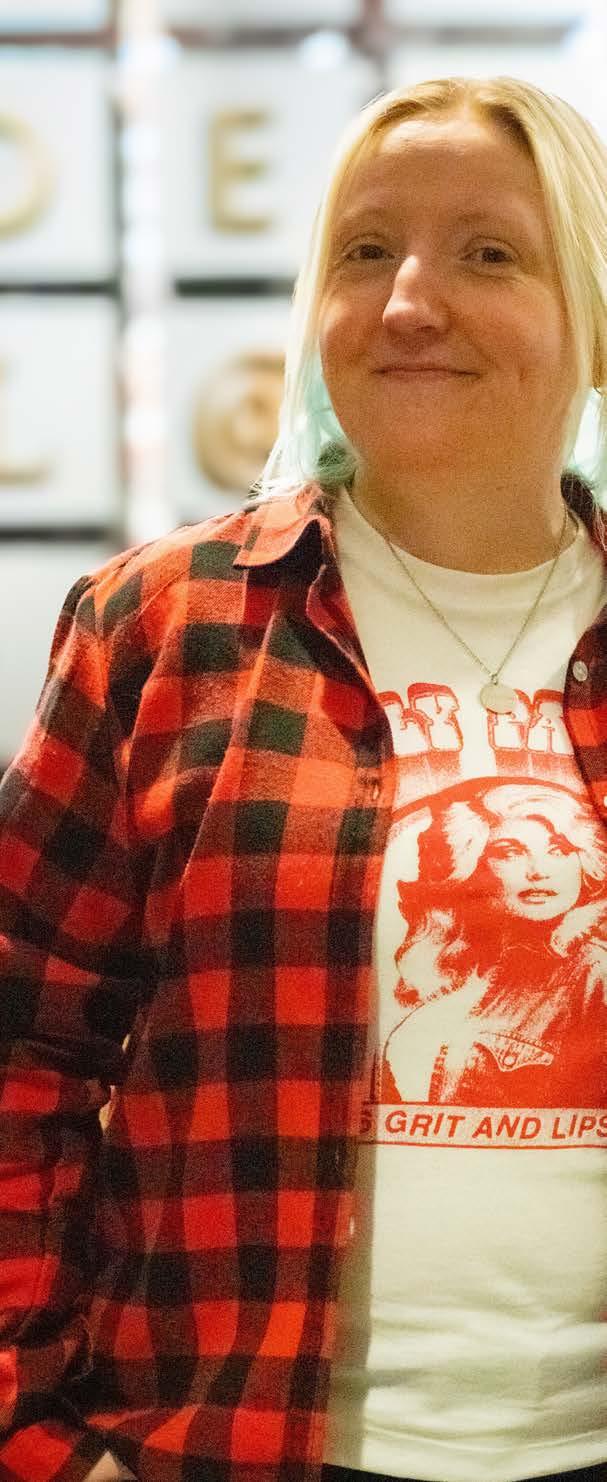

approach.
q When you’re working in the industry, how do you know when you're on the right path?
I think it's easier to identify the sense of dread you feel when you are not on the right path. Realistically, there are always going to be elements of a job that you don’t enjoy doing, and lots of people talk about the Sunday dread of going back to work after the weekend - I mean, wouldn’t we all rather win the Euromillions and sit on a beach all year long? You have to listen to your gut about these sorts of things. If you’re really facing work with dread every day then something isn’t ok.
Even aside from this, you can get bored if you don’t find your work interesting. There needs to be motivation for you to give your best. When that isn’t happening, it can be time to look for a change.
If you find yourself in this position, talk. This is where your community comes in. Talking to your network outside of your office can help you to understand what might engage and interest you in a role. Then you can talk to your manager about the possibility of moving to a different role or even just finding something that engages you more within your current role.
Finally I’d say - without seeming to encourage job hopping here! - don’t be afraid to move. It can feel intimidating to start somewhere completely new, but don’t let fear of moving put you off finding the right track for you.
q Is there a role to play for careers coaches, internally and externally? What about mentoring?
I think external career coaches can be incredibly useful, just to have someone unbiased who can be objective about your situation. Internally, I’ve had some great managers who have given great advice on where they think my particular skills would be most useful.
Mentoring is also part of that process of knowing whether or not you’re on the right path. It’s much more tailored to the
hands-on specifics of your job, to help you get more out of it. For example, when I moved into the lead role, I knew what work we needed to do, but I had no idea how to figure out how long it was going to take to do the work with a team of people. Luckily, I had a mentor who was lead on a team close to ours who would spend half an hour with me every Friday to answer these sorts of questions, which was fantastic. It’s great to have someone with different career experience in the industry who can give you a fresh perspective.
q In terms of careers, is it really important to set goals and aim to achieve targets, or does it happen more organically?
For me, I’ve always prioritised getting better at whatever I’m doing as long as I’m enjoying it. So I will set specific goals to improve in that area. Or if I'm not enjoying what I’m doing, I will set a goal to be somewhere different or doing something different within a particular time frame. Some people have very specific things that they want to get out of their career, and they will absolutely need to set goals to move towards it.
q So, if you do want to move into a new sector or a new department or do a slightly different job, how do you go about learning the new skills and attaining the qualifications necessary? First of all, take stock of what is needed for the roles you are considering.
I think there's a statistic that says men on average will apply if they meet 60% of the criteria but women need it to be 100% before they even apply, so don't be afraid to go for something even if you don't meet all the requirements.
If there is a definite gap where you need to learn something new, make sure you know your learning style. There are loads of books and written resources for learning, but I need to be hands on myself, doing tutorials and trying things out. There are great online resources now, with online tutorials easily accessible and free for everyone.
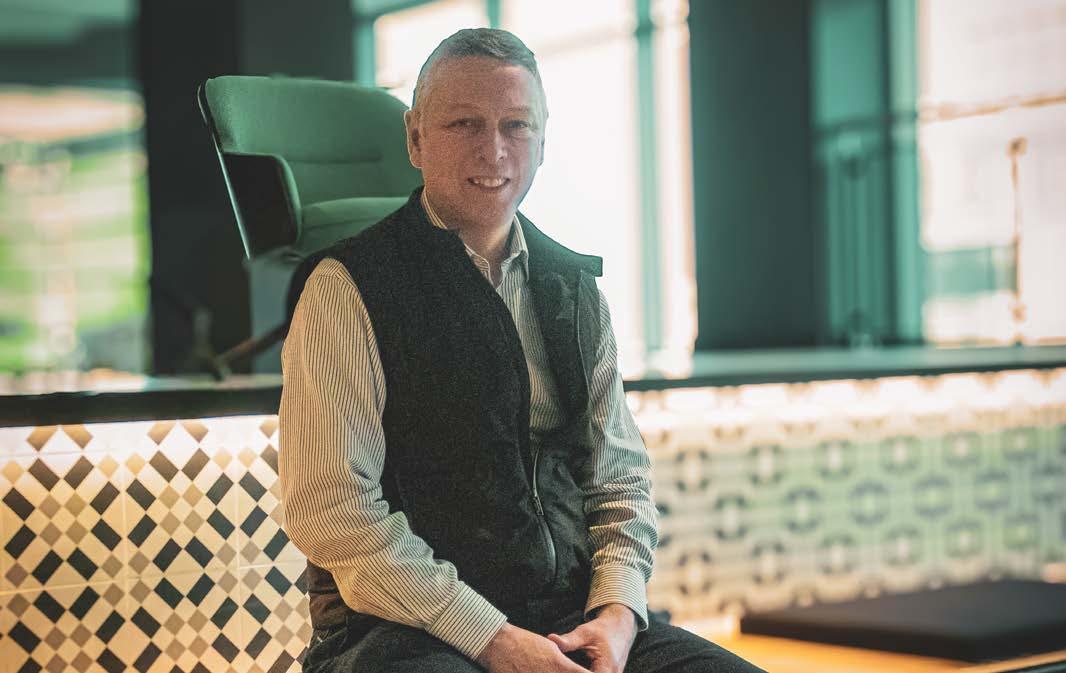
Horner,
Engineering
q How would you summarise your first year as VP Engineering and what are your expectations for your team in 2024?
My first year has been both exciting and challenging, but challenging in a good way. The exciting part is to join a company as big as Rapid7. With around 2,500 employees, it’s big for me but at the same time, it still maintains a really warm, small company feel. There’s a lovely culture. I feel it every time I walk into the building and people say good morning. It’s generally a really nice environment to be in.
The challenging part has been the steep learning curve. Although my previous two roles were in the same industry, cybersecurity is an extremely complex area to be working in. It’s always evolving. Not to mention that coming into a new role at any level means learning about everything from the products and the technologies to the people and the
structures in the company. At this stage, I feel like I now have ownership of the pieces that I'm responsible for and I'm moving forward from there.
There is lots more to get excited about in 2024. Our Belfast office is growing all the time, with a long list of open roles on our website. This is fantastic because it shows the trust the company has in this office, in this group of people and in this part of the world.
We're also making great inroads in our cybersecurity work areas, with a number of projects either extending existing products or combining them in different ways to bring a better user experience. The last week or two was spent putting together a detailed roadmap for the year that we're rolling out across the teams. There's a lot of work to be done but it's both interesting and challenging work, so it’s all good.
q As a Cyber Security software business, how does Rapid7 continually improve its products to address an evolving threat landscape for its customers and to what extent do machine learning and AI play a role in this?
Machine learning and AI encroach on every aspect of our lives now. It’s everywhere. When I'm talking at the dinner table with my 80-year-old aunt and she's asking me about chat GPT, that's when you know it has hit the mainstream.
We've been using elements of AI for many years now, having woven data analysis into our products pretty much since the beginning.
However, the threat landscape and the environment that our customers have to deal with is evolving rapidly. Attackers are using AI to create threat vectors, which are ways of attempting to extract data, knowledge and money from our customers. In response, we are taking advantage of the recent advances in AI to help us identify those attacks and establish where the patterns are.
This year we have set aside two roles specifically dedicated to AI as part of our placement student intake and that's just a small part of a much bigger group of cybersecurity experts that the company employs here in Belfast as AI becomes part of everyday life.
q As new technologies emerge, what new skill sets will you seek to invest in and develop within your engineering team and where do you see opportunities for growth within the business in particular?
As a company, we’re predominantly focusing on skills around the shift to cloud. Most of our customers are running security operation centres or their own security initiatives. They are used to working with infrastructure that is in their own environment or in their data centres and in many ways are still playing catch up with the shift to cloud. They have spent many years looking at vulnerabilities on operating systems or on physical hosts, and now they're being asked to track what's happening in AWS accounts. Without a good understanding of privilege escalation or exposed datasets, they don't really know what to look for or how to interpret it.
As a result, one of our major areas of investment is in our tools and products that address cloud security. We’re helping organisations to be action-oriented so that they can not only see threats and risks but they can understand them and act to remove them.
q Are there specific skill sets that you try to focus on when hiring engineers to join your team?
For the younger generation who are coming straight from university, our main
focus is on their values, enthusiasm and passion for their subject. Obviously, as people progress in their careers we start to look more and more for technical excellence as well, but cultural fit is really important for us.
We want people who enjoy what they do and who share our core values. For example, one of our core values is that you’re never actually finished, and that there is always room for improvement. We want people who will be asking, what does my customer need? Am I advocating for my team around me? So, those core values are one of the key things we look for when we’re hiring.
q What kind of continuous growth, learning and development exists at Rapid7 for engineers?
I am a believer that every day is a school day. For a start, there’s a fundamental onboarding process that every employee has to go through to get informed about all the different tech at Rapid7 and to get up to speed with their team.
Then we have team events where individuals can present on any element that they’re working on that interests them. That employee learns presentation skills and the attendees learn about what other people in their team are working on.
We have formal online
training sessions and libraries of content that employees can access if they really want to study a certain subject. We also have a fantastic library in the building stocked with lots of fantastic books of all types, and team members are encouraged to set aside time to read whatever they’re interested in.
Employees also have the opportunity to move around within groups and experience different projects, bringing good habits and ideas from one area over to another. We benefit as a company and the engineers get to experience a variety of work in different project areas.
Across the company, we push our teams to bring people out of their comfort zones, so I'm always bringing people with me on to customer calls so that they can experience what the customer is going through. Nothing sharpens focus more effectively than a customer firing questions at you about a subject that you thought you knew! That really helps you understand just where your limitations are.
On a monthly or quarterly basis, there are learning opportunities with events like trade shows and conferences. There are so many different opportunities for growth but in the end, I think it all comes down to just how much you want to learn.
Susan McCambridge shares some insight into the Assured Skills Programme and her journey into the tech sector
q Why did you join the tech sector?
I wanted to do a Business degree, but my mother was a careers teacher and she suggested that I do a new degree in Computer Science with Business. I soon realised I did not want to be a programmer. I really enjoyed talking about Business and Technology and realised that a role in Business Development would suit me. I applied to several graduate schemes and after university joined Hewlett Packard as a Sales trainee.
q What did this involve?
For two years I would spend one week in the Solihull office and the next week in Europe at different Hewlett Packard locations learning about the technology they manufactured and Business Development training. It was a fantastic opportunity.
q How has this early experience impacted your career?
Business Development is about building relationships with a range of people and this is a key asset in the technology sector. Selling involves you being able to understand a business issue and help others achieve their goals. It develops communication skills, problem-solving, networking and resilience skills as well as developing your internal product or service expertise and relationship management skills with a range of stakeholders both internally and externally. These are all core skills which can apply to any role in the tech sector.
q Would you recommend a Business Development career in the Tech Sector?
My career in Business Development has provided me with the opportunity to
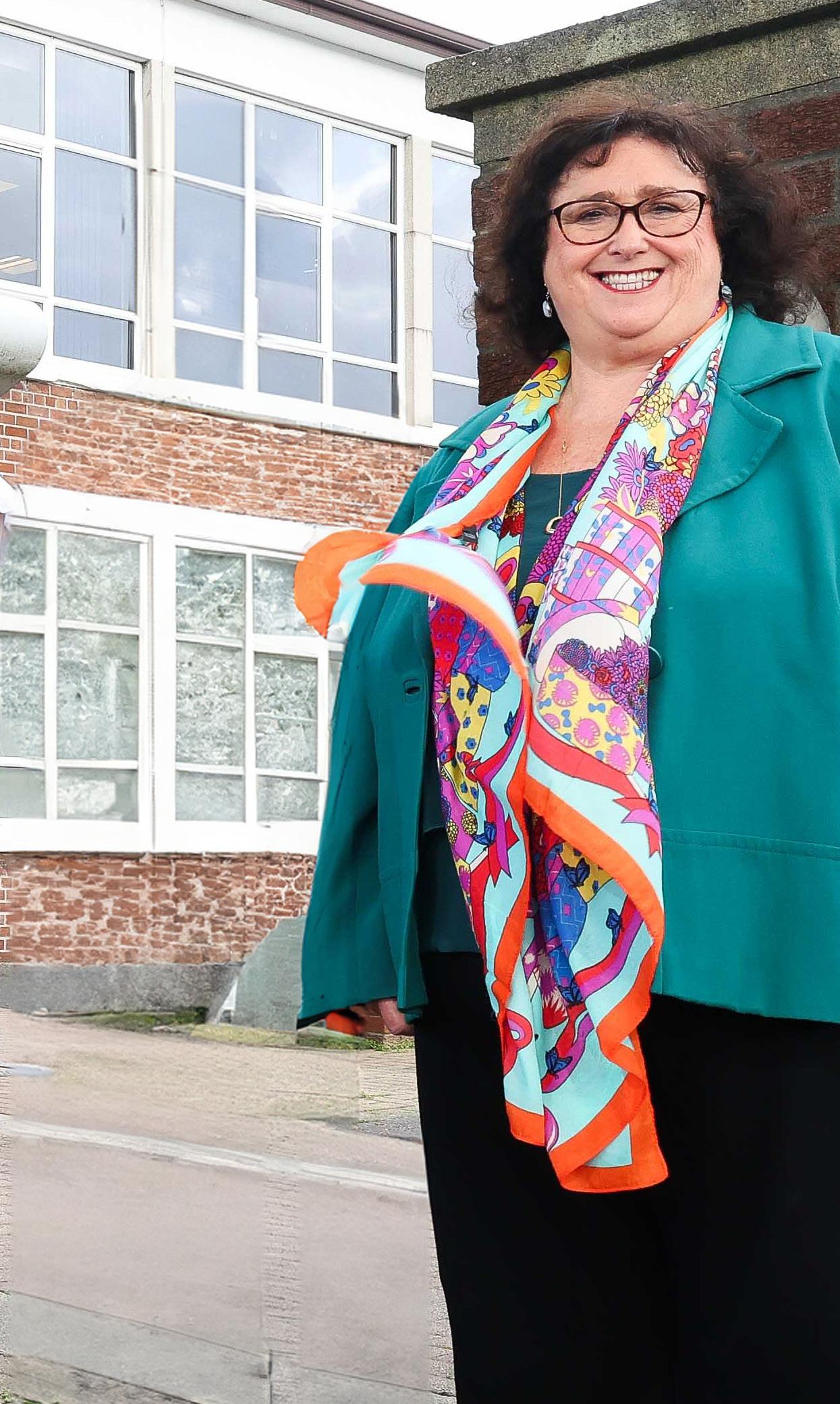
FirstUp announces plans to expand their workforce
Q&A with Susan McCambridge, Economic Development Manager at Belfast Metropolitan College
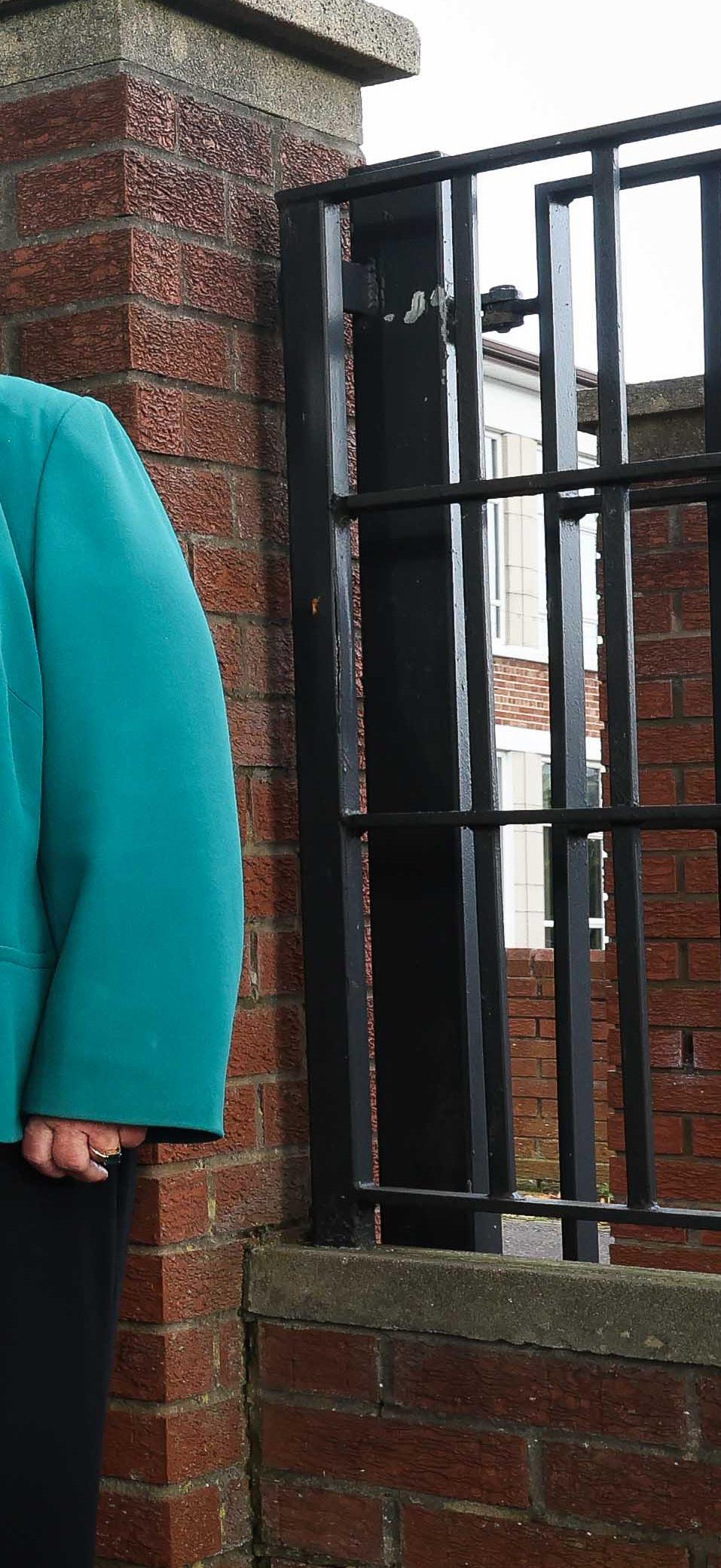
use the skills I have learned in a wide range of areas. I have sold multimillion software development contracts for a large IT company and my own IT Business Development business which outsourced part or all of the Business Development cycle for global consultancy businesses.
For the last 10 years I have used my relationship management skills to lead the Assured Skills programme for Belfast Met. This has contributed over 2500 skilled professionals to companies through NI and has supported the growth of the Digital and IT sector.
q Can you tell us more about the Assured Skills programme?
The programme is designed to upskill individuals and help them compete for guaranteed job vacancies in new foreign direct investment (FDI) companies and expanding businesses.
Since 2013, Belfast Met has delivered over 148 of these graduate retraining programmes working with companies such as Microsoft, PwC, EY, KPMG, Metaswitch, Aflac, PA Consulting, TPICAP, Deloitte, Version 1, Sensata, PA Consulting and FinTrU. We provide a pipeline of potential employees in areas including Artificial Intelligence, Applied Intelligence, Cyber Security, Data Engineering, Data Analytics, IOT, Software Testing, Modern Application
Development, 365 Cloud and Cloud Engineering. Funded by the Department for the Economy (DfE) the Programme offers six to nine weeksr preemployment training. The programme typically includes the latest technical, business and professional skills such as resilience, stakeholder engagement, communication and problem-solving skills.
Academies are designed in collaboration with companies involved, with content directly relevant to the skills required for the job roles and including the latest certifications recognised by industry.
The students are graduates from any discipline and many are 10-15 years post-graduation looking to move into the IT sector but have no IT background.
q What advice would you give to someone who would like to change career or consider a career in tech?
There are a vast range of roles in this sector and companies value the experience that new entrants bring. It is a vibrant, well paid and growing sector with a wide range of roles apart from coding. The website www.bringitonni.co.uk has information about how to enter the IT sector.
I would wholeheartedly recommend a career in the IT sector; I have loved every role I have had.

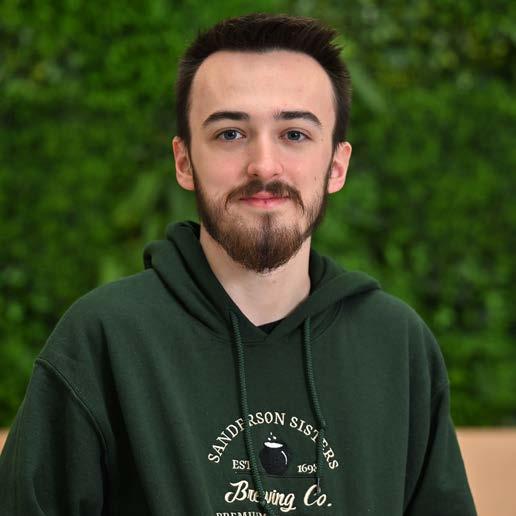
Navigating a career in tech isn't always a linear journey and for ESO Belfast’s Dani McCutcheon and Josh Beatty, their pathway into the industry was less than conventional
Despite not initially considering a career in industry, tattoo artist turned product designer Dani was inspired by other successful females in the industry who spoke about their experience.
Similarly, Josh’s journey into tech was fuelled by the vastly evolving landscape of healthcare technology and his passion for community volunteering and first response. Now a Graduate Development Engineer, he joined ESO in 2020, a year that brought unprecedented challenges but saw his role become more a vocation than a job - delivering on ESO’s global mission, as it remains dedicated to improving community health and safety, and empowering frontline workers to help save lives.
ESO’s Belfast team is responsible for engineering, developing real-time data analytics tools, sophisticated algorithms, and secure data-sharing platforms that positively impact communities worldwide. The leading data and software company recently marked four years in Belfast, an investment which has helped the US firm to continue to empower emergency services.
Dani who joined ESO in June 2022, transitioned from a foundation course in graphic design to a degree in interaction design at Ulster University. A career change which stemmed from a desire to look at user needs beyond a visual perspective and saw Dani secure a placement year at ESO.
Dani said, “ESO Belfast was my first choice due to its unique user base which includes Emergency Medical Services (EMS) and frontline healthcare professionals such as paramedics, A&E departments, and firefighters. I wanted a chance to apply and enhance my knowledge in an environment where the user experience is central to its products and for me, it was amazing to think that something I was part of designing could play a role in improving EMS efficiencies and making their jobs a little easier, knowing the impact these professionals make in communities across the world.”
Dani currently works part-time at ESO Belfast one day a week whilst she remains focused on completing the final months of her university degree. In her role as a product designer, she champions the needs of users, overseeing the complete lifecycle of products from research and workflow development
to design implementation and rigorous testing.
She continues, “A typical day for me could involve calls with users to identify ways in which they carry out their roles, how ESO’s products can help and where we can improve product design to ensure patient or community needs are being met. A big part of my job is also carrying out research and collaborating with the wider team including our amazing team in the US. This includes leaning on best User Experience (UX) practices to ensure products are not only accessible but easy to use and can ultimately help improve community health and safety.”
Before joining ESO Belfast, Dani admits she always thought the industry was male-dominated, and it wasn’t until she spoke to other females in tech during a university visit that she was inspired to think about how her skillset could be an asset in the industry.
Prioritising the promotion of a diverse and inclusive workplace has been key to ESO’s success in the last four years. Ahead of International Women’s Day in 2023, ESO Belfast reported a 10 per cent increase in its female workforce from 2019 to 2022, with women now making up 27 per cent of the team and supporting its commitment to achieving gender diversity.
Dani adds, “It’s as important to find a role that works for you instead of always working to fit the job. In addition to ESO’s user base, I’m fortunate to work with and continuously learn from inspiring people around me. The culture, support, and continuous learning opportunities distinguish ESO as a workplace that goes beyond the ordinary.”
As a final piece of advice, Dani encourages individuals making a career change to not underestimate the value of their existing skills, emphasising that the tech industry appreciates diverse
talents. Like Dani, Josh joined ESO Belfast during his placement year at Queen’s University Belfast during the pandemic. His initial onboarding as a software developer was fully remote but despite the unique circumstances, he embraced the experience and rejoined ESO part-time in his final year before taking up a full-time position in 2023.
What inspired Josh to join ESO was the opportunity to work for a company developing software for first responders, aligning with his passion for community volunteer work. He continues, “If I hadn’t pursued a career in tech, I would have explored a career as a first responder, perhaps as a paramedic or firefighter. During my university years, I volunteered with St John Ambulance for two years as a first aider and despite moving on from that role, I still have a passion for community volunteer work.
“Given this interest, the opportunity to work at a company developing software for first responders immediately caught my attention. At the time, ESO had recently established its Belfast office with a small engineering team and taking a gamble, I applied to the company for their first-ever placement position. Looking back, I’m extremely grateful to have seized the opportunity to work as a developer for a cause I find genuinely interesting and a company I am proud to work for.”
Describing his current role as a Graduate Development Engineer, Josh takes pride in being a versatile developer, akin to a jack of all trades. While his primary focus is on backend development, his daily responsibilities extend to frontend development, testing, CI/CD tasks, DevOps responsibilities, and quality assurance.
Josh explains, “The most rewarding aspect of my work is the opportunity for problem-solving, especially when confronted with challenging tasks
that extend beyond my knowledge. Embracing challenges and venturing into unknown territories is particularly enjoyable, whether it’s navigating an unfamiliar tech stack, investigating problems, or implementing a new function app.
“The power of data cannot be underestimated and ESO does a fantastic job of digitising its processes in EMS and Fire agencies and aggregating this data. I can only imagine how much this has streamlined paperwork for frontline workers, not to mention the reports and research that have come out of analysing patient and first responder data.”
Reflecting on his journey, Josh’s advice to his younger self would be to enjoy the process and focus less on stressing about exams, emphasising the importance of trying new experiences, exploring different projects, or volunteering opportunities. He emphasizes the accessibility of tech careers and encourages others to explore the diverse roles available in Belfast's thriving tech industry.
Josh concludes, “Everything taught in schools and universities can be selftaught online or through alternative learning experiences. Belfast has no shortage of open roles across a plethora of tech roles, part-time and full-time. No matter your interest you’ll be able to find your fit.”
Recently, ESO Belfast announced the appointment of four new directors and a senior vice president including two new hires and three internal promotions - which will see Russell Beggs take up the role of Senior Vice President (VP) of Engineering – highlighting the company’s strategic vision and its commitment to nurturing talent, making it an ideal workplace for those looking to thrive in the tech industry.
For more information on ESO and current roles visit eso.com/careers
For anyone working in, starting out or simply considering a new career within the Technology Sector we asked six senior female leaders to share their own personal journeys and based on their own experiences offer practical advice to their younger less experienced counterparts
The Female Leaders Roundtable event was hosted in the boardroom of the recently refurbished Custom House and was the ideal backdrop to engage with senior female leaders to help support younger women in tech as they seek to develop their own careers.
Stacy Mallon
Stacy Mallon is the Site Lead for Wolfspeed NI. Wolfspeed is a global semiconductor company leading the transformation from silicon to silicon carbide (SiC) and shaping the future of semiconductor markets: the transition to electric vehicles, the evolution of renewable energy and energy storage, and the advancement of industrial applications. For over 35 years Wolfspeed have focused on designing and supplying the industry's highest-performing silicon carbide materials and devices for high-power applications.
Wolfspeed NI is Wolfspeed’s Global Capability Centre delivering digital capabilities, enterprise shared services and intelligent technical solutions to the Wolfspeed organization. In her role as Site Lead Stacy is responsible for setting the vision and strategy for the Global Capabilities Centre to drive scale and efficiency improvements aligned with business needs. She also plays
A conversation with some of
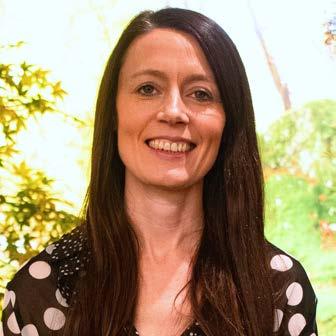
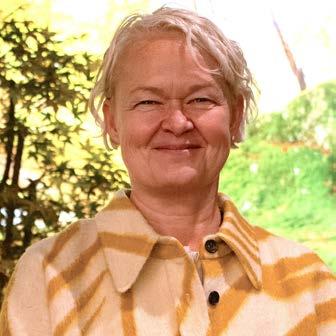
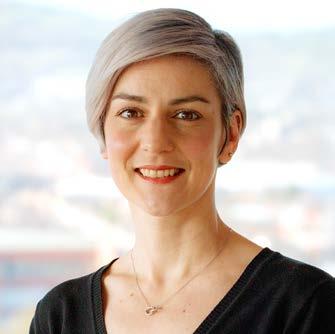
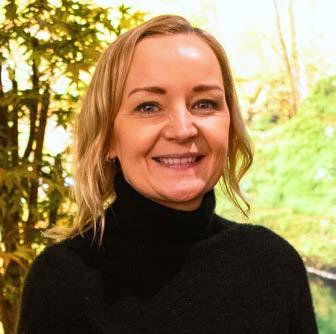
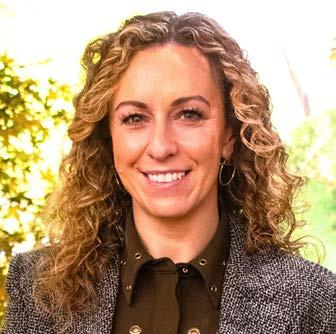

a global role as part of the Senior IT Leadership team implementing strategic digital transformation initiatives to support Wolfspeed’s technology vision, future growth and global operations.
Stacy has experience in a diverse set of roles across several industries. Before joining Wolfspeed to set up and lead the Northern Ireland Operation she was Director, Infrastructure and Security at Vela Trading Technologies for 10 years where she was responsible for infrastructure and security for the company globally.
Fiona Campbell
Fiona Campbell is Controller of Youth Audience BBC iPlayer and BBC Three. Having been at the BBC for the past 13 years and previously five years at ITN before that, a journalist by background Fiona spent several years on Panorama and worked extensively in foreign war zones reporting wars.
Around 2013 the BBC made a large investment into mobile news and online news, and Fiona became the controller of online and mobile her first step into working on the product side of things before moving into entertainment where she is now responsible for BBC Three and the home of Drag Race, Glow Up, Normal People and Young Offenders.
Catherine McCourt
Catherine McCourt is the Head of Engineering at Aflac NI, an American supplemental health care insurance company that established their Technology Centre of Excellence business in Belfast just over 4 years ago.
For the past 2 years Catherine has been responsible for the engineering department for Pega, which is a low code platform employing 35 engineers. Prior to joining Aflac Catherine worked for Citi for 15 years starting off as an application support engineer for a mainframe system, and ultimately becoming responsible for production application support for global custody and direct custody.
Lisa Stevenson
Lisa Stevenson is Site Lead for APEX Fintech Solutions, a global digital assets company establishing the Belfast office four years ago rapidly building to a headcount of 90 people and continues to grow as they expand their engineering and operations departments.
Lisa originally started out working as a software engineer and has worked within several global technology focused businesses including the Chicago Mercantile Exchange across a number of roles developing new products within the FinTech sector.
Lyndsay Shields
Lyndsay Shields is Head of Data and Analytics for Danske Bank in Northern Ireland. Her team is a division of Technology and Digital Development which includes roles ranging from business analysts, software engineers, API and PEGA developers to name a few. Lyndsay’s responsibility cuts across the end-to-end data lifecycle; everything from data engineering right through to analytics and Gen AI. With a long career in Danske Bank, Lyndsay progressed into project and change management and then into senior roles in business transformation and strategic project delivery. Sitting on the Technology Leadership team, Lyndsay now plays a key role in the digital transformation of the Bank. Lyndsay is also an advocate of diversity and Co-Chairs the banks Gender Diversity Committee, and sponsors their Women in Tech initiatives.
Lorna McAdoo
Lorna McAdoo is a Director with Version 1, a global IT services provider headquartered in Dublin. Lorna joined the organisation 10 years ago to set up, run and build the business in Belfast. The current headcount is around 560 people now and Lorna’s personal aim is to take it to 1,000 before she retires. Lorna is also responsible for the group’s environmental, social and governance
strategy delivering a net zero strategy and is heavily involved in diversity, giving back to the community and engaging with schools to create more employability into the tech sector. Lorna has worked within several well known technology organisations beginning her career with Shorts as a developer before focusing on a successful career as a project manager engaging with customers across account management and delivery management.
Catherine McCourt: Let’s start the conversation and begin with ‘How do you know if you are on the right path’? For me it’s about fulfilment which comes down to understanding your own interests, passions and purpose. In a previous role we used a Venn diagram style tool, which I recently found out was based on a Japanese philosophy called Ikigai. It asked; ‘What do I like doing?’, ‘What am I good at doing?’, and ‘What use is it to anybody else?’ Whatever falls in all of those three categories is the sweet spot that sums it up for me - if you’re getting something out of it and somebody else is getting something out of you, then surely that’s the right path.
Lorna McAdoo : For me, its about loving the work that you do and feeling a sense of purpose and development. I love what I do. The sense of fulfilment has always been there so I don’t think I have ever questioned the path I’ve been on.
Lyndsay Shields: I’ve been fortunate too that for the majority of my roles, I’ve felt that sense of purpose and ability to create impact which is my north star. It’s important to remind people early in their careers that paths are not linear, there are so many options to reskill, move sideways, try other things – so our “paths” are very unpredictable.
Stacy Mallon: That is a great point I see lots of placement students and graduates who think they must take
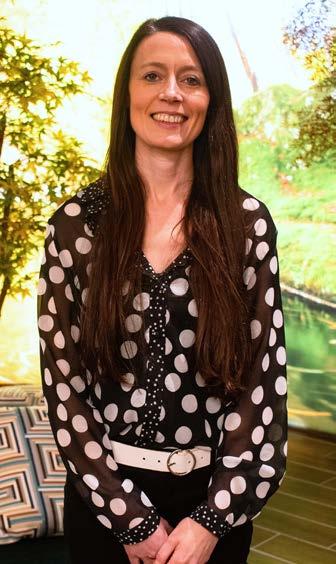
a role in software development role when thet graduate because that’s what most of the focus is on during their degree course The reality is very different and when they come to work at Wolfspeed we are always quick to show them that there are lots of other options open to them, from problem management and change management to infrastructure and security roles.
I think the main thing is to make sure you are happy and you are challenging yourself to learn new things. Something I’ve talked a lot about recently is the importance of understanding your ‘why’. In the first six months of my current role I found myself completely overwhelmed with everything that was going on. I realised I had to take a pause to take some time to reflect. Iended up spending an entire weekend thinking about my why trying to understand what my purpose was and why I was doing what I was doing. This understanding gave me a sense of clarity and purpose to know that I was on the right path. . It’s important though to acknowledge that your ‘why’ is probably going to change at different
stages of your career as you grow and evolve.
Lyndsay Shields: I think in technology and data there are so many options available to people but there is a perception that these roles are codingcentric, when the reality is it’s actually a broad spectrum of roles. Internally, we’ve been showcasing this and the range of skills that are important –technical skill is certainly important in some roles, but there are other valuable skills like problem solving, presentation skills and solution design. We want to attract future talent from other parts of the Bank so it’s important to dispel any myths and make sure people don’t get put off by the ‘techie’ image to ensure a more inclusive appeal.
Catherine McCourt: Some of those roles are really not visible to students. Certainly when I was at university, we weren’t really aware that those IT service delivery and support roles are a real spectrum. It wasn’t until we got started that we saw all the different options available.
Fiona Campbell: I try to encourage the younger people and the apprentices that I sponsor at the BBC to go for lots of jobs. This is because in the process of applying for the jobs and going through the interviews, you get to know what your natural tendencies are, which really helps you to identify your path. Plus it all adds to your experience.
I used to have a rule that I never stayed in a job for more than two years. And it stood me in really good stead, because I worked in a lot of places and gained a lot of different skills very quickly in my 30s and early 40s. Sometimes people can be reluctant to leave a good seat, but early in your career I think you have to push yourself to keep moving.
Lorna McAdoo: I think the trick is to embrace any challenge that comes along. You need to take yourself out of your comfort zone to get experience

and develop skills quickly. Our responsibility as leaders is to be able to show young people the opportunities that are out there and support and encourage them to take it
I completely agree with Fiona’s point about going for interviews, and I’ll add that when it comes to interviews, I think we have a tendency to ask the wrong questions. We ask; ‘Am I good enough for that job?’ when actually we should be saying ‘Is this role good for me? Is it something that I’m going to grow and develop in?’
Stacy Mallon: And I think if you were coming to an interview with that attitude, you would come across much better to the person who is conducting the interview. The advice that I always give to anyone that I interview is to interview us as much as we interview you.
Catherine McCourt: I agree that showing genuine curiosity for the company and the role and how things are done is much more appealing to an interviewer than someone who's come
with a templated response that they're hoping to give to everybody.
Lyndsay Shields: Yes and in early careers I think academies and apprenticeships are fantastic. We offer a range of different apprenticeships such as our Danske Futures program where you can study for a fully funded degree while working. Other internal academies and what we call ‘squiggly shadowing’ also give people insights into different roles and help build careers and explore the many opportunities on offer.
Lisa Stevenson: I always like to make sure that the young people I’m mentoring are able to receive feedback with a mindset that’s open to changes and opportunities. This is especially relevant in tech, as we are eternal students who must keep on learning, to keep on being curious, and to keep on asking for opportunities to grow. My mentees will come to me and ask how they should approach a conversation about opportunities with their manager, and it’s important that young people feel they have the safe space to do that.
Catherine McCourt: I think people can sometimes fear having that kind of conversation to ask about different opportunities because it might seem like they’re letting you down in some way.
It should be about supporting people with what they want to achieve, because they supported the team and they've done their job well. I suppose it's not like that in every company but anywhere that I've worked with a supportive atmosphere, you want your employees to do well, regardless of whether they're in your team or whether they happen to move to someone else's team as they go around that journey of gaining different skills.
Lyndsay Shields: It's important for leaders in technology to be comfortable with that and encourage it. Because the pace of change is fast in tech, there is
continual skills development and people do tend to move a bit more than they do perhaps in other industries. So it’s crucial we encourage this and also look at how we develop pipelines of future talent.
Catherine McCourt: You always want people to have a good experience working with you and then to be an ambassador for the company even though they don’t work there any more.
Stacy Mallon: One of the most rewarding parts of my role is when you see people who leave for a different team or sometimes a different company but for a better opportunity for that individual. It's so nice to see that, there is nothing more rewarding than to see people develop.
Lorna McAdoo: I think as women we need to look at how we can continue to support females when they leave us, and encourage them in their new role and in their new job. I've found over the years in the tech sector that the men were always very good at staying friends and continuing the network and the friendships when they left companies. I’d love to see a bit more of that sort of support on the female side in the new tech sector going forward.
Fiona Campbell: Speaking of support, I was once at a women’s round table event where Tessa Jowel came in to speak to us all about her career path. She talked about a challenging period of her life when she was an MP with two small children at a time when the House of Commons was not a child friendly place. One day she was preparing to give a very important speech when she got a call to say her son was really, really sick. And Alistair Darling said to her, I’ll give the speech in your name, go and be with your son. And the lesson there was to build your network of friends and supporters as wide as possible and maintain it because that is what will carry you through your tougher moments.

My own network has allowed me to work across so many types of television because I get to hear what is about to expand, what’s about to be invested in and where the opportunities are. It’s not a transactional thing, it’s about building a genuine group of people who try and help each other.
Catherine McCourt: In my career I’ve built a reputation of being able to fix things that are broken. Some people would shy away from those situations, but I’ve always liked being able to improve a situation. So I feel like I’ve built my network by helping people out and perhaps they may feel inclined to help me in future. You don't do it in a transactional way, it’s just the result of doing a good job and making an impression on people.
I have often felt quite reluctant to move on from a job, because I’ve always felt a strong sense of responsibility to the people that were around me. I worried about how everybody would get on without me, or that I might be letting somebody down. It took going off on maternity leave for me to realise that I
had been able to leave a legacy as such that everyone coped without me. And then that break was a perfect segue for me to look for the next project. I think sometimes people worry about taking maternity breaks, in that it might slow you down, but for me it was just a good clean break to go and try something new. It definitely helped me stop being afraid to move on.
Lisa Stevenson: ‘Let's talk about resetting if you're on the wrong path’ I did this when I was a software engineer before I realised my strengths lay more in projects, delivery and organisation. I moved from a senior position running a network team to starting in a junior role at the bottom of project management. I had to take a pay cut and take courses to make up for my skills gaps, but having a good network definitely helped accelerate things for me. It all felt right because I knew that was ultimately where my strengths definitely lay.
I found that self-assessment is really important for checking that you’re on the right track. If you’re working in software engineering and you’re doing retrospectives, I would say do a retrospective on yourself. Ask what you’ve learned and what skills you’ve gained. Ask if you’re moving forward in the way you want to.
Lyndsay Shields: Yes I think that selfreflection is really important. Asking yourself – am I stretched in this role or is it comfortable. I never like to get too comfortable. I’d also recommend seeking feedback; for example where do others see your future potential? If you need to reset, don’t wait. I would say go ahead and explore your options. I think it's quicker now than it ever has been before to change your path.
Having some short term goals in mind is a good idea for young people - do they see their career in leadership and technology or in a senior technical kind of role? It’s useful to have a sense of
what that might be. If they're not sure, they can try out both and see what they connect with.
Catherine McCourt: I'm interested to hear if others had a plan. Were you shooting for something in particular? I always just wanted to enjoy myself and impress people!
Stacy Mallon: I feel like I had a plan, but where I am now wasn’t part of the original plan! What I have learned throughout my career is that you can have a plan but it's okay if it doesn't work out. You have to have the resilience necessary to adapt and change in case things don’t go the way you planned.
When I first graduated, I went to work for First Derivatives and was thrown in at the deep end in my first week, being sent to London on my own with the name and phone number of a person that I had to meet. It was a very daunting experience for me, but it taught me to put myself out there and be strong. I think sometimes nowadays young people seem like they need a lot of support but sometimes as leaders, you just have to step back and let them figure it out, and even let them fail. It’s all about finding the balance.
Lorna McAdoo: I definitely didn't have a plan. I still don't. And I've never felt like I was on the wrong path. I have reset in the past by moving to another organisation, purely because I wanted a bit of variety or because I didn't feel valued where I was. When you wake up in the morning and feel valued, it’s very hard to leave somewhere behind. However, I've been very lucky because lots of my bosses and managers have seen opportunities coming up and encouraged me to take them, but its never been part of some well thought out plan.
Lyndsay Shields: I think it is really important for us as leaders to create those stretch opportunities and projects
that are going to help people to step outside their comfort zone, to tackle difficult things and learn that it's okay to make a mistake.
Catherine McCourt: When you talk about resilience, sometimes I wonder if it’s a fear of failure, or a worry of the consequences that holds people back from trying new things. It's important to create a culture where people know that it’s okay to find things hard, and even to fail. And of course that could end up with somebody inexperienced deleting a database or shutting down a production server - but we try to keep our mistakes to a minimum and work hard to not make the same mistake twice. When you're challenged, that's when you learn, so as leaders we have to allow people to put themselves out there.
Fiona Campbell: I'm an apprenticeship evangelist. A lot of my current team come through the apprenticeship programme, which is incredible. It's very transparent, they get a really broad experience in the organisation, and in my experience, they all get retained.
On the other side of that, I have my leadership team who are in their 30s. Some of them have just recently become parents, and it’s interesting trying to encourage them to push themselves where they want to go. Some of them are hitting that classic wall where they find it really lonely in leadership. So I just try to support them and make them not feel alone. I have to say, yes, it is hard, but you do have to step forward and own what we're trying to do, and just keep going.
Lisa Stevenson: Do you have any advice for anyone who wants to have a career change?
Fiona Campbell: I am a big advocate of having a career coach. I've had a leadership coach for eight years now and I find it’s a great sounding board.
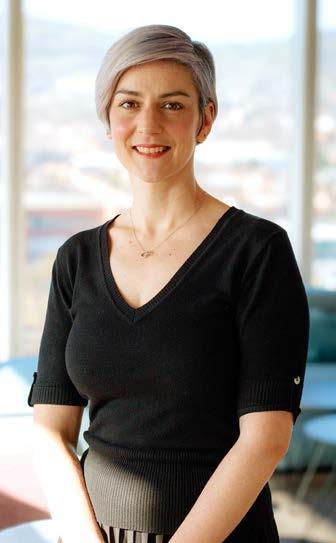 Catherine McCourt Head of Engineering, Aflac NI
Catherine McCourt Head of Engineering, Aflac NI
Internally, we have coaches that people can draw on to talk through what they're frightened of, how to position themselves to go for roles, how to have greater ambition, or how to speak up for themselves more. Often I think somebody who's more neutral and is not involved in the politics of the organisation can get your head up and above the daily struggle, and give you a greater resilience to go for things or to hang on in there rather than just feeling throttled by everything that's going on. I think they are a really worthwhile investment of time.
Stacy Mallon: Whenever I first met with a coach, I thought they were just going to tell me what to do, but then I realised that they ask you questions so you can figure out for yourself what you're going to do. Looking at things from a different perspective was the most valuable part for me.
Lisa Stevenson: For me, it was being completely honest and probably a bit vulnerable, to allow myself to say to someone, this is where I’m good, here is where my weaknesses are and asking how to overcome that.

Fiona Campbell: I think it’s worth noting that very often coaches will see somebody for free for the first session. And some people who are training as coaches need people to practise on to get their qualifications, so that would be free too.
Lisa Stevenson: I've had women reach out to me on LinkedIn and ask if I’d mind giving half an hour of my time, and we’ll just do that over coffee. And I've loved doing that. It feels a bit like giving back to the community because there were no female leaders there for me when I was going through the tech departments at the start of my career.
Catherine McCourt: There is something really powerful in the coaching approach. Whether it's from a formal coach that you're paying, or someone else that you know, the questioning really allows you to develop clarity on your own thinking. When you say it out loud it puts a different perspective on it. It’s not something I always enjoy, but you can see the power and the value of it.
Stacy Mallon: That point makes me think about mentors that I have had in my career and how important they have been and still are to me. I have had people ask me, so how do I get a mentor? And I have always found that it’s a hard question to answer because often relationships with mentors come about quite organically. What steps would you say someone has to take to find a mentor?
Catherine McCourt: Well, first there are some formal mentoring programs that you can enrol in.
Lisa Stevenson: We installed one in our company just after I joined and it was great. Because we are part of a larger group you might end up having a mentor in a different industry which is fantastic because you just get this totally different perspective.
Lyndsay Shields: We have a brilliant company wide program too that means everyone in the organisation has access to a mentor if they choose. Structured programs work really well, I also think it’s important to work out what you need from a mentor and where you can find the best match. When I first started my role in technology and data and I felt I needed support from a senior female leader in tech given the unique challenges we face. I reached out externally, organised a coffee which was a bit like a blind date, and formed an informal mentoring relationship that was so impactful at that juncture in my career.
Catherine McCourt: I think about my mentors as most of my old bosses, and most of my peers today. We peer mentor each other often. Whenever I'm dwelling on an issue that's really hard and I can't quite see the way out of it, I just say it out loud to somebody who may or may not have a parallel challenge and they'll offer their perspective.
Lorna McAdoo: The question ‘Who
was your biggest mentor?’ always comes up, and I’d always thought that I’d never had one. I had loads of people that I would go to for advice, because they were either more senior or a peer that I had a lot of respect for, but I wouldn’t have called them a mentor as such. I think the closest I ever came to a mentor was when I started out in Version 1 and had to grow the team in Belfast. Between recruitment and branding an organisation that no one has even heard of, I didn’t know where to start.
Then one weekend I was going through LinkedIn and I saw that Patricia O'Hagan had won Woman of the Year in the Women in Business awards. I thought to myself, she started her own organisation, and I messaged her out of the blue asking for a coffee and some advice. She was able to tell me straight away what associations and organisations to hook up with to really get in there and start networking. That was 10 years ago and Patricia has been there for me ever since. So I think that's actually what a mentor is all about.
I would say have a look on LinkedIn, see what's happening in Northern Ireland, look at the people you aspire to be like and message them because the chances are they will meet you for a cup of coffee and give you whatever advice they can.
Stacy Mallon: I agree with the need to keep in touch. Lorna, you mentioned that maybe as females we probably don't tend to keep in touch with others for whatever reason. However, I do believe that a lot opportunities for mentorship come from the relationships that we build and maintain over time so if you're working with someone that you feel you have a good relationship with, keep in touch with them and build that network.
Lyndsay Shields: And just be bold about asking people! What I have found is that they usually are happy to help.
Stacy Mallon: Yes, don't be scared. Most likely the person isn't going to say no. When people have reached out to me I am always more than happy to meet for a coffee and chat and pass on what I’ve learned to someone else. I often find that I also get something out of the chat; we should all be open to learning from each other.
Lisa Stevenson: Do you think there is a formal strategy required to set goals and achieve targets?
Lorna McAdoo: I used to do an annual operations plan which I used as a way of getting commitment to what I wanted to do. It wasn't about hard rules, it was my way of positioning exactly what we wanted to achieve that next year, and it did work. I did that for about three or four years until the strategy was much more advanced and aligned to the company plans, having that formal strategy did help.
Lisa Stevenson: I like a checklist to be ticked off. One of the things that I ask my team is what new skills they are going to learn this year and what they want to gain deeper satisfaction in. Then I realised that I hadn’t learned any new skills this year myself. I felt really bad that I have spent so much time nurturing others that I didn’t take the time to invest in myself, so that's definitely at the top of my list for this year.
I think it's good to have a vision. The strategy could be something like a vision board or a checklist or something, just to keep me on track and maintain focus throughout the year.
Catherine McCourt: Something like that would certainly help you to hone your decision making as you go through the year. Whether or not you go back and double check that you hit every bullet or not, at least you started out with some direction in mind. I think it always helps when you know roughly what you’re shooting for.
Lorna McAdoo: As leaders, we have to convince everybody else in the team that we know what we're doing and the direction that we want to take the team. Having a strategy is a great way of being able to communicate that really clearly.
Catherine McCourt: When we talked all about purpose and your ‘why’ - if your teams don't know the purpose, then it's hard for them to have motivation and commitment.
Fiona Campbell: We have a process called My Conversation, which is a twice yearly career development meeting. It formalises the opportunity for every line manager to listen to employees’ needs with regard to their career development and the opportunities they might be looking for. I think it's working really well, because a lot of people weren't getting that time to talk about their own role, and now you can see those conversations happening. I think this culture change really helps to retain people.
For me, post COVID it was all about trying to stabilise the team, to reshape the budgets, the headcount and the workflows. Now that we're nearly there, I think it’s time as a leader to start thinking about what I want to do. Previously I've just been busy trying to get the new leadership in place and do a bit of pipeline planning, but now it's time to think about myself as well.
Stacy Mallon: As leaders, if we’re not having these conversations with people in our company, then they don't have an opportunity to understand that there might be another role in another team that actually might be a better fit for them.
As a person, I am process-oriented so I like to have more of a formal strategy with goals in place. I believe in objectives because I think they allow the person to understand what the company expects of them and how they can be successful. Having a structure for

goals and objectives helps inform endof-year performance reviews and helps everyone to understand what they are doing well and where they should focus improvement efforts. You can be flexible with the process, however actually having a process and structure for this helps set expectations.
Lyndsay Shields: Our way of managing development and performance goals is called My Journey. Performance and behavioural goals are set for the team at the start of the year and it’s distilled down the team. During the year we have regular reviews of the plan, career conversations, reviews of development plans, frequent check ins and one to one conversations. This ensures continuous improvement and focus - without it, the day to day could take over and performance and development wouldn’t get the focus it needs.
Catherine McCourt: I think that anyone who doesn’t have this should absolutely ask for it. I don't know how you would know if you're being successful if you don't have some kind of structure
in place to assess it and get regular feedback.
Lorna McAdoo: If you don't have that kind of structure, then you have no way of assessing or talking to people about your next move. Or all those questions we need to ask regularly, like ‘How well am I doing?’, ‘What am I good at?’, ‘What do I need to improve on?’. We have these conversations in Version 1 on a quarterly basis and I think that if anyone were to stop having these conversations, that’s when they might start thinking that no one is interested, that no one is listening or that nobody cares about them or their career. And that's when the question of leaving might creep in. I think we have to be constantly listening to our staff and our people.
Lorna McAdoo: Previously I think that the attitude was very much ‘You are being paid to do a job’, but now it's very much, ‘What kind of environment can we give you to be the best you can possibly be’.
You only need to go on to LinkedIn to see how differently companies talk about what they offer nowadays. It’s much less about what they are doing in terms of profit and loss and much more about what their employees are doing, the social events, the sense of community and giving something back. It's a softer approach and I do think we are definitely moving towards a working life that is very different to what we had, particularly as parents bringing up kids.
Lyndsay Shields: That change needed to happen. My mum put her career on hold to raise four daughters. Today’s generation grapples with the challenge of maintaining a career while raising a family - complicated by expensive childcare and increased reliance on grandparents, who are still working themselves. As a parent of a four year old and my partner and I working full time – it’s absolutely non-stop with
both of us choosing to work full time. There’s a constant feeling of guiltguilty that I need to leave work at 4 o’clock, but I don’t want her to be the last child sitting in childcare and feeling awful those days I’m running late to collect her. It’s crucial for companies to recognise that if working parents are to succeed, then there needs to be real flexibility. The flexibility I have in my role is truly what fuels my work life balance and makes the juggle possible!
Lorna McAdoo: I have total empathy for any young working mum juggling parental responsibilities and a career. My kids are in their 20s now, and they joke about how they were always the last kid to be lifted in the evening! I realised that's not actually how I want to be remembered as a parent. But what they took away from it was that I was hard working and I wanted to give them a good life, and I can see they now have a similar work ethos themselves.
Catherine McCourt: I think having a really frank conversation at home about the splitting of duties is really important. Sometimes there's an unspoken allocation of household duties without intention, but that is something that really needs a conversation. It becomes pretty easy to navigate once you say, we're in this together; your job’s hard and my job is hard and we support each other.
Lyndsay Shields: This is so importantit is hard work bringing up a young child, and that work needs divided equally, especially for parents choosing to work full time.
Catherine McCourt: I think that the things that you can plan for are fine but it's the things that you can't plan for where you need other people to be able to help you.
Lorna McAdoo: I think we have to be very careful not to set the impression that you have to have this perfect balance in your life to be able to
have your career and your family. For example, you can take your career breaks. We've had really successful women coming back into Version 1 after up to 20 year career breaks, and because of their sheer passion they are able to have their moment and it’s their time to really shine. It's a personal choice. You can go about your career in whatever way suits you as an individual.
Catherine McCourt: As we said before, there is no right or wrong, you make your own path.
Lorna McAdoo: I think it's also really important that women know that if you have taken time out to bring up your family or to care for your parents, then you can still have your career when you're ready for it, it'll still be there for you. This helps get women back into the workplace, and then we can benefit from all the amazing skills they have developed during their time working in this different way.
Fiona Campbell: I would also like to emphasise the importance of stepping out from whatever situation you’re in and taking the opportunity to attend meetups like Women in Tech, or Women in Film and TV, to hear the conversations, to find support and to ground yourself in the bigger story. It does take time, but it pays off. Even if you go to just one of these things a month, it builds up over many years. But you really need to go there or you might find yourself a bit directionless, not knowing what is going on or what opportunities there may be out there for you.
Lorna McAdoo: There are so many support networks out there, whether you're in full time employment or not. Don’t let anything stop you from going along and listening to everybody else's experiences. You’ll find very quickly that you're not on your own.
Lisa Stevenson: It's just taking the time out, like an hour or so to go.

Stacy Mallon: And it could be that you're not very comfortable in those situations, but push yourself to go.
Fiona Campbell: There is an organisation called Speakers for Schools where they send people into schools to open the next generation’s minds about the many different types of jobs that are available in tech. When I was at school, nobody talked about the kind of job I've ended up in, so it’s great to be able to tell young people ‘I came from school like you, you can do this’. This is really important, because before long those 12-year-olds will be 20-yearolds.
Lyndsay Shields: Absolutely, talking to children about roles in technology is vital for shaping future tech talent. We're proud to be a founding partner of the SistersIN initiative. If you're not already involved, it's something I’d definitely put on your radar. The program pairs you with a 16 or 17-yearold mentee and gives them a first-hand look into your role. It’s an incredibly meaningful way to demonstrate to young women what it looks like to be a senior female leader in technology and share the invaluable skills we gain along the way.
Lorna McAdoo: We are involved with Speakers for Schools and SistersIN as well. When we started Version 1 in Belfast, we set up an engagement group for the new graduates who had
joined the company, and asked them to volunteer to go out to schools and talk to pupils. It was a fantastic form of personal development for them because not only did they feel like they were adding value to the company, but they were giving back to schools and learning a lot of amazing soft skills like how to talk to young people, how to do presentations and how to start developing that mentoring-type skill set.
Lyndsay Shields: I see this too when developers take the stage and showcase their work - it has such impact.
Lorna McAdoo: They suddenly become a consultant. But they keep their authentic side, because they're talking about themselves. You just see a total difference in them.
Catherine McCourt: There’s something very special about being able to show you understand your subject matter so deeply that you can translate it in a way that’s suitable for a different age group to understand. There’s something really nice about that, as well as showing adaptability in the way that you communicate.
At Aflac we have a culture of continuous learning. It’s a fundamental part of our identity as a company and its so important for all our staff. It keeps them current and sharp but it also brings increased motivation and job
satisfaction. We really invest in the personal development of our staff and incentivize everyone to learn a new skill each year. My advice to anyone starting out in their career would be to really embrace learning and personal development as a fundamental part of your role, set personal targets and take on stretch opportunities. Don’t forget that learning comes in many forms too and try to identify activities under each of the 3 Es: Education, Exposure and Experience.
Lisa Stevenson: Do we have any other networking tips?
I always advise any team member going to one of these groups or events for the first time to really think about how they are going to introduce themselves. We encourage them to think about how they want to come across, what they want to say and how they want to be remembered. As leaders we do it all the time - we are always thinking about how we are putting ourselves, our company and our brand across well. But young people need to spend a little bit of time thinking about this and even practising what they are going to say. They have to learn their elevator pitch.
Stacy Mallon: That is a great idea! In Northern Ireland in particular, we are quite humble and we tend to talk ourselves down a little, so I think it is a fantastic idea to take time to think about how we can pitch ourselves.
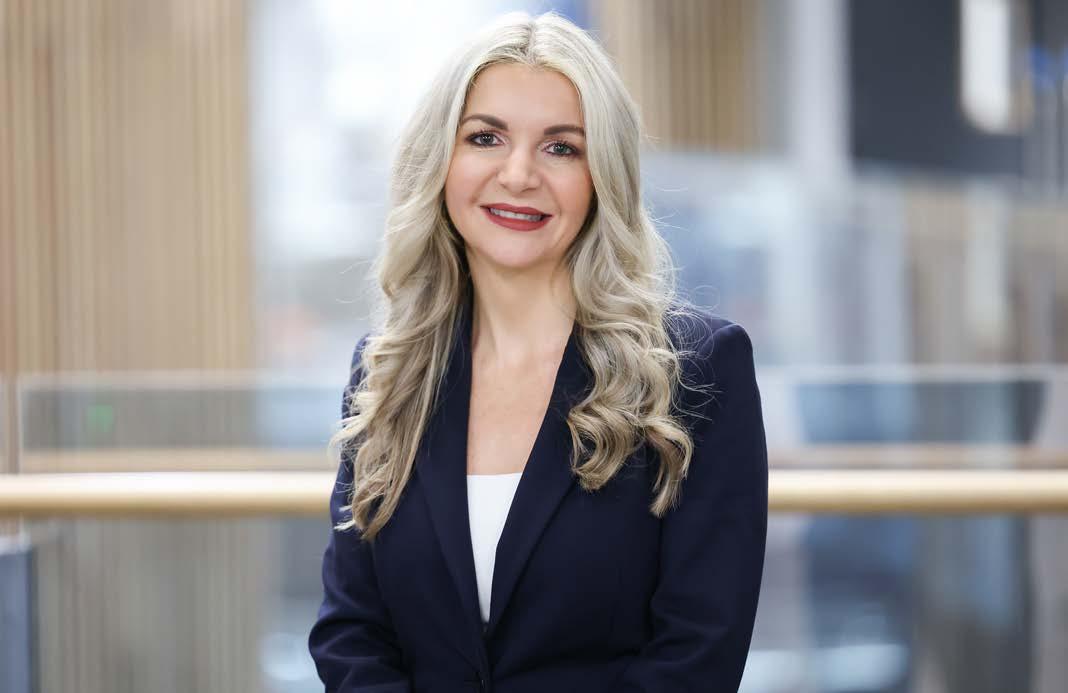
Kristel Miller, Professor of Entrepreneurship and Small Business Development at Ulster University, reflects on why there seems to be a lack of women within the tech sector
Afew months back I was out for a walk with a female friend of mine, who asked for some advice on how she could enter into a new career. She had worked for many years as a manager prior to having her son, and now that he is at school she wanted to try to develop a new career for herself.
I advised that she should consider the technology sector, since it is a sector which is rapidly growing and will transform how we live and work. However, she immediately said “I could never work in the tech industry!” and when I asked her why not, she had this mental depiction of a male programmer sitting in front of a computer each day.
This interaction sparked me to reflect on why the perception
around technology careers has not changed much over the past 10 years despite the fact that a career in technology is now more encompassing than ever, spanning a broad spectrum of roles where you don’t need coding skills, such as working in senior management, product/software managers, designers, content writers, operations, social media and marketing and customer services.
I have been inquisitive about tech ever since when we received our first home computer in 1995. Being open to a career in tech was deeply engrained in my mind from that day. That conversation with my friend stuck in my mind, since despite her being very highly skilled, the technology stereotypes are deeply ingrained in society and result in mental blocks leading to many overlooking a technology career. The lack
of women choosing a technology career perpetuates the issue, where the industry continues to be male dominated, reinforcing stereotypes. To try to understand what causes mental blocks, it is useful to draw on cognitivebehavioural theories. In simple terms, cognition (beliefs and mindset) can influence someone’s behaviour (i.e. a woman’s decision to pursue a career in tech). However, understanding what impacts someone’s cognition is complex.
A very influential psychologist, Albert Bandura, developed the concept of ‘social cognitive theory’ in 1986 which identified a dynamic interaction between people, their behaviour and their environment. The ‘social’ element identifies the important role which social contexts play in influencing our thoughts and actions (e.g. family, friends, work colleagues, media, institutions). For example, if someone cannot see or hear about the many different types of tech careers available for women, or see diverse role models in tech, then this reinforces stereotypes which become engrained into someone’s mental model. Mental models are a representation of how something ‘works’, which can include societal expectations or perceived industry based norms.
As we get older, we have more life experiences, which makes our mental models more robust. For example, if a woman does not see diverse women role models in technology careers, that will mean that their beliefs are reinforced that a tech career is not for them. It is clear that introducing young women to the wide range of technology careers available as young as possible, and emphasing that a technology career can be for everyone is very important. This will help develop mental models which view a career in technology positively. However, even for others who may feel that a technology career is not form them, their mental models can be changed. But this will be harder
and will require a combined effort from both policy makers and employers to work collaboratively to help change beliefs and mindsets which are deeply engrained in society.
There is a real need for appropriate support and skills-based interventions to help the Northern Ireland (NI) technology sector to create a more diverse workforce. Whilst there are good examples of businesses taking the lead to be innovative with pathways into technology careers, more can
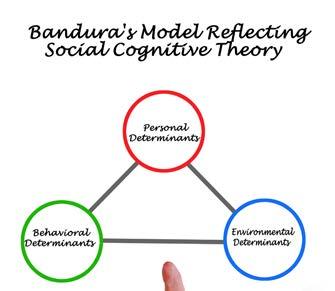
still be done for particular groups. Women, individuals with disabilities and individuals over 50 form a large portion of what can be called the ‘hidden unemployed’. The ‘hidden unemployed’ are individuals who are economically inactive, can and do want to work, if they can find meaningful work which aligns with their circumstances. I truly believe these individuals can offer a lot of skills which are much needed in the NI technology sector.
There is a real need to explore the lived experiences and factors which shape the mental models of women in NI to understand how they can be supported to pursue careers in technology. This is not to imply that the reason for a lack of women in technology lies with women not taking action. As noted, policy, employers and education providers need to do more. However, to help shape more targeted interventions which can truly break down stereotypes and deeply engrained mental models, there is a need to explore and showcase women’s lived experiences. Only then
can we fully understand the social and cultural contexts which may limit the attractiveness of technology careers.
I have been fortunate to be conducting research which aligns to this area. Ulster University recently led a funding bid alongside external partners from across education, policy, community and business representatives, to secure £4.8million to develop a Local Policy Innovation Partnership (LPIP) in NI. This project is funded by the UK Research and Innovation’s (UKRI), under their creating opportunities and improving outcomes theme. Our NI Local Policy Partnership is called ‘EPIC Futures NI’ which stands for ‘Economic and Social Partnering for Inclusive Innovation and Collaboration (EPIC) to contribute towards a prosperous and sustainable future for Northern Ireland (NI)’.
As part of our work, we will develop an open forum for collaboration across NI, in order to fill data gaps and provide an evidence base to inform policy and supports aimed at alleviating NI’s most pressing skills and labour market challenges. This includes taking a deep dive into factors which influence the behaviour of hidden unemployed groups such as women, individuals with disabilities and individuals over 50, who are seeking to enter the labour market. One of our outputs will be a labour market observatory for NI, which we hope will help individuals see more clearly the range of careers available, not only in the technology sector, but across other sectors too. It will also help them to map out the pathways they can take to pursue their career ambitions.
I hope our project can make an impact and play it’s part in helping break down mental models. We are early on our journey, but are passionate at doing our part in helping NI’s skills and labour market challenges. If anyone is interested in following the work we are doing and would like to explore working together collaboratively, please reach out to us at @EPICFuturesNI.
Colin Higgins, Learning & Development Manager at Liberty IT, reflects on the company’s recently redesigned TechStart Academy
q What is Liberty IT’s TechStart Academy?
Our TechStart Academy is a combination of three programmes designed specifically for entry-level employees, ranging from those leaving secondary education, completing thirdlevel education, or retraining from a different industry or role.
Through TechStart’s inclusive and engaging programme of learning and connections, we aim to support our diverse teams through their early careers at Liberty IT.
We have programmes for three career stages – Apprentices, Interns and Graduates, and each one has its own dedicated learning journey, designed to focus on developing the skills needed by the employees at that point in their career.
q Over 40 graduates joined the programme in 2023 and a further 60 will join later this year. What can they expect to learn and achieve during their time in TechStart?
The programme starts with a 12-week academy delivered in our Belfast office, where we have created a dedicated floor for our new starts to learn, connect, have 1-2-1s and socialise. There is also the opportunity to work from home to complete some selfpaced learning.
The TechStart Academy blends technical, career and business education through training and onthe-job learning. So whilst we cover programming languages and technical skills which are really important to our engineers, we also cover an array
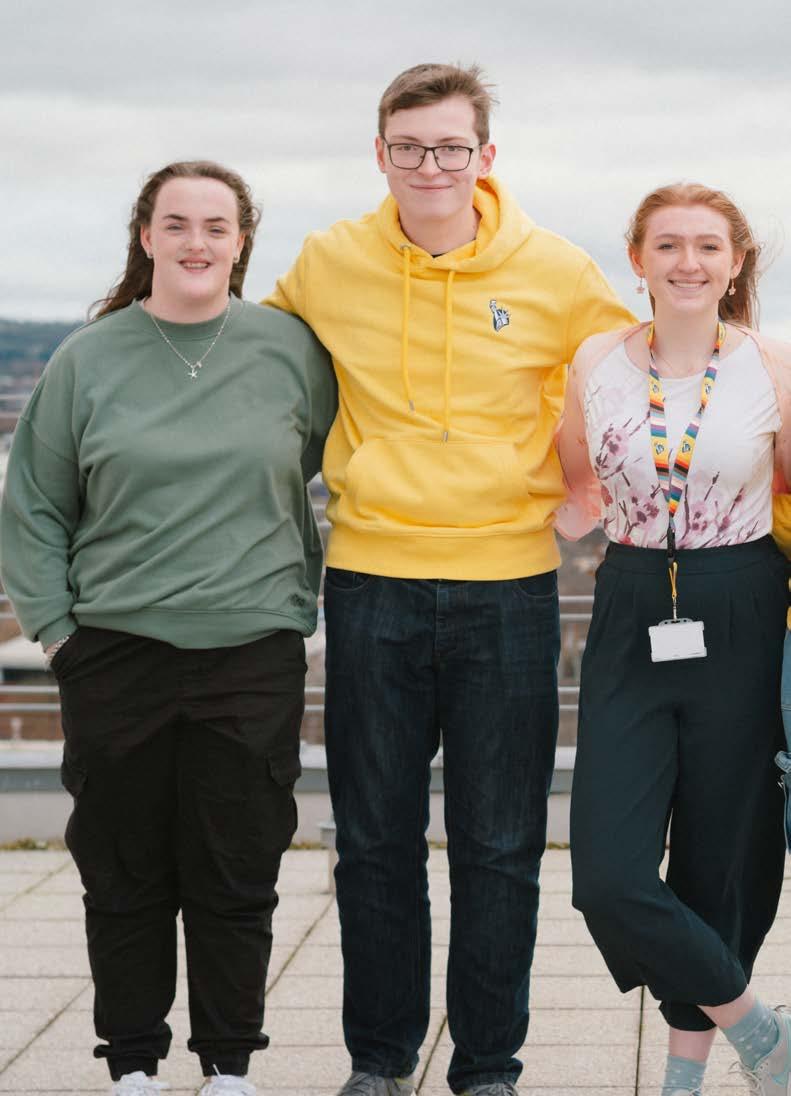
of other skills which are also needed such as cloud engineering, data, testing and deployment, agile methodology, security and much more.
We want to support our teams through their transition from student life into working life and arm them with the right skills to thrive. We’ve developed modules on professional and business skills, such as communication, time management, personal effectiveness and building networks.
Business integration is also very important. Our employee research told us new joiners are thirsty to learn about our business of Insurtech, as well as our technology organisation. We have welcomed a long list of guest speakers to share their stories and experiences with our teams about the different areas within the business, the technologies they use and the impact they have across the globe. These sessions provide great insight into life at Liberty IT. Last year we also had some

VIPs drop in, including none other than Tim Sweeney, the CEO of our parent company, Liberty Mutual Insurance.
q Tell us more about the TechStart Apprenticeship?
We have engaged in various apprenticeship schemes since 2015. In 2022, we reviewed all of our entry-level programmes, validated with our teams
Apprentice offerings.
We wanted the programme to be an Entry-Level route into the technology world, attracting a diverse range of candidates from across the island of Ireland.
We currently have eight new apprentices who joined in September 2023 - seven of which are completing their HLA Level 6 apprenticeship in conjunction with Ulster University. They will complete a 4.5-year degree whilst gaining valuable practical experience and earning as they go along.
We have another Apprentice who is taking a different apprentice route. She has previous experience in the IT sector and is a returner to the industry. We are piloting a bespoke learning journey which will give her all the skills she needs to thrive in her career as a Software Engineer. As this is a new pilot, we hope to develop it further to support the needs of future diverse applications.

across the organisation and performing at the Senior Software Engineer level. We are proud to invest heavily in our programmes and the talent taking part in them, to give a unique insight into a career with Liberty IT and help each participant realise their full potential.
and developed an enhanced experience of learning and connection.
We spent a number of months in collaboration with Liberty Mutual Insurance identifying learning needs analysis and feedback. We researched industry best practices and built deep academic partnerships to understand the different
Over the past number of years, we have supported approximately 30 employees through various apprenticeship schemes. Two of our former apprentices have recently been promoted to Engineering Managers. They are now responsible for managing and leading teams, delivering projects and ensuring our engineering practices are at a high level.
There are others who are also developing their careers
q What are the advantages of apprenticeships compared with the traditional graduate entry pathways into a software company such as Liberty IT?
Becoming an apprentice with Liberty IT offers several advantages compared to taking the more traditional university pathway.
Here are some key advantages that our current employees have told us:
Earn while you learn: As an apprentice, you are employed by Liberty IT for the duration of the programme and earn a salary, whilst gaining
practical on-the-job training. This allows apprentices to start earning and becoming financially independent at an early stage of their careers.
Industry-specific skills: Apprentices are provided with hands-on training in a specific industry, allowing them to develop practical skills that are directly applicable to their career
Recognised qualifications:
Most Apprentices gain a recognised qualification through Ulster University, which ensures that their learning is accredited by a professional body and they can achieve a BSc in Computing Studies in 4.5 years.
Supportive learning environment: Working with Ulster University and our Liberty IT business partners, our apprentices participate in a defined and structured training program, with dedicated managers, mentors and supervisors who provide guidance and support throughout their learning journey. This support system enables them to thrive and succeed.
Real-world experience:
By collaborating with experienced professionals, apprentices gain valuable real-world experience and develop the professional skills necessary for success in the workplace. Through a dedicated learning path, our Apprentices also develop skills such as teamwork, problem-solving, communication skills and personal effectiveness.
q Having completed the apprenticeship, what qualifications will successful applicants achieve and are there opportunities to gain further professional or academic qualifications within the business?
Our current Apprentices will complete a BSc in Computing Studies, studying one day per week at university and the other four days working in Liberty IT. They will also have a dedicated training programme within Liberty IT to ensure that all the relevant skills are developed throughout the four years.
If they continue to develop and excel in their practical skills and grades at university, they will also have the opportunity to secure permanent employment with Liberty IT after two years. This also comes with the added bonus of being promoted to Associate Software Engineer and also qualifies them to participate in the TechStart Graduate Programme.
Once an Associate Software Engineer, they will then be able to advance their careers through our Self Nominated Process.
All Liberty IT employees have access to a wide range of learning opportunities through our self-paced learning platforms including LinkedIn Learning, Pluralsight, O’Reilly and Udacity, as well as instructor-led training on technical training and professional skills and so much more.
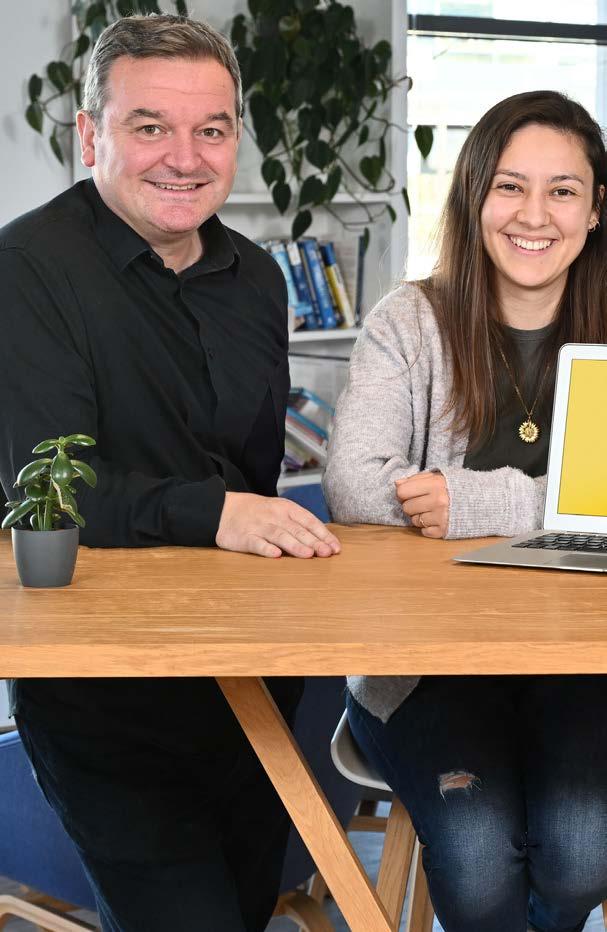
To further enhance the learning experience we offer coaching, mentoring, tech talks, hackathons, conferences, assignments, certifications and much more. All employees have access to the right education, experiences and exposure to develop their careers at Liberty IT.
q What are the most rewarding aspects of forging a career in software engineering?
A career in Liberty IT as a software engineer can be highly rewarding. Here are
some of the most rewarding aspects that our employees inform us of:
Problem solving: Software engineering involves solving complex problems and finding creative solutions. The satisfaction of tackling challenging issues and seeing your solutions come to life can be incredibly rewarding.
Continuous Learning: The industry is constantly evolving and requires continuous learning. This is fulfilling as you are acquiring

new knowledge and skills. There are always new technologies, frameworks, and programming languages to explore, allowing for personal and professional growth.
Innovation: Software Engineers have the opportunity to make a significant impact on the world. They can develop innovative solutions that improve people's lives, streamline processes, and transform industries.
Collaboration and
teamwork: Software engineering often involves working collaboratively in teams. This allows for engaging with diverse perspectives, learning from others, and collectively achieving goals.
Global impact: Software engineering has a global impact. As Liberty Mutual Insurance is a global organisation, the solutions we provide can be used across the world. Technology transcends boundaries, and software engineers have the opportunity to work
more than just software development or coding, and whilst there are elements that focus on writing code and implementing software solutions, a software engineer takes a more comprehensive approach. They not only write code but also analyse, design, and plan the software system as a whole. They consider various factors such as scalability, performance, security, and maintainability.
Software engineers have a broader set of responsibilities. They take a holistic view of the software development process, including requirements gathering, system design, architecture, project management, and quality assurance.
on projects that have a worldwide reach.
q For anyone who thinks working within software engineering is simply all about ‘coding’ can you talk more about the diverse roles and opportunities that are available to new employees once they complete the TechStart programme?
Yes, Liberty IT is mainly a Software Engineering organisation and approximately 70% of our employees work in this area. But Engineering is much
There are a wide range of roles that you can potentially progress onto from Software Engineering. You can still remain in the engineering roles and venture into data, AI / MLOps, cloud or cybersecurity engineering. Or focus on deepening your technical knowledge in roles such as Solutions Engineer or Architect.
Whichever path you choose, Liberty IT offers the right support to ensure that you are successful.
For further information on Liberty IT’s TechStart programmes, go to www.liberty-it.co.uk/careers
Our Apprentice program is open for 2025 intake.
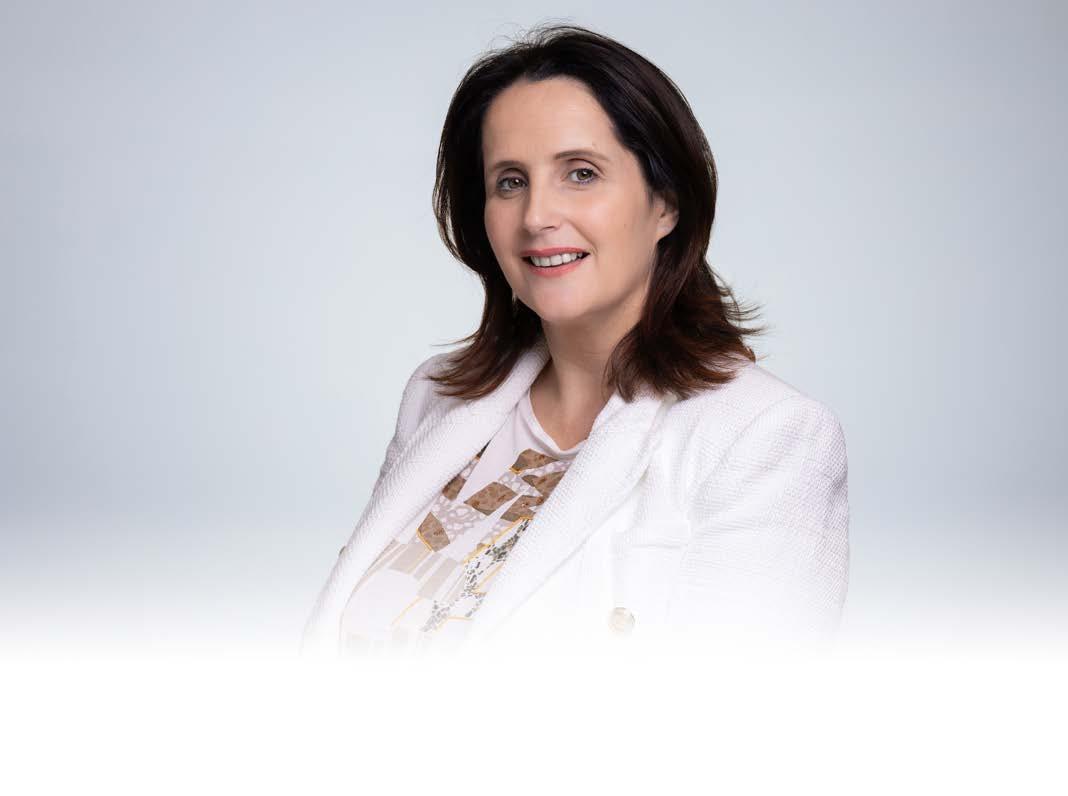
Maire Doyle’s journey at Deloitte began in 2004, back when technology was the career of choice for recently graduated computer scientists.
Fast-forward 20 years, technology is embedded into every aspect of business, fully integrated into all elements of working life. Marie, who joined the firm as a graduate economist, now a partner in Enterprise Technology Consulting in Belfast, says this shift has revolutionised career opportunities for young people. “We still have many opportunities for software developers, but it goes well beyond that. We also work extensively with data testing and analytics, programme management to implement new technologies, benefits realisation and change management for clients.”
Technical skills in a wide range of fields remain important, however soft skills, e.g. communication and teamwork are becoming more vital in today’s modern tech landscape. “For example, my work is with public sector clients, who have
traditionally been slower in their digitisation journey than the private sector,” she says. “Some of the people I’ve worked with have been with their organisation for 30 or 40 years and I support them in change management, helping them up realise the benefits of adopting new technology. It’s a completely different role to that of a coder or an analyst, but equally important in the tech sector, because without implementation and management, we can’t use technology.”
Increasingly, client demands are focused on technology and the products and services that Deloitte is developing reflect that. “Generative AI is an example of an area that’s really taken off,” says Marie. “It will be transformational for clients, society, and our business. We’ve identified it as a strategic growth opportunity in Belfast and we’re making plans to nurture talent in this space.” For example, the firm has recently launched a new generative AI platform, PairD, designed to help the firm’s people with day-to-day tasks,
including drafting content, writing code, and carrying out research safely and securely. “We’re providing free access and support for the platform to disability equality charity, Scope, one of our charity partners. At least 800 staff at the charity will have access from this year, which we hope will benefit them and the people they support.”
Machine learning and robotics are in high demand, with clients realising that simplifying processes using technology can free up people’s time for other work, increasing efficiency. “I don’t see these systems as replacing jobs, more streamlining some of the administrative tasks, so that people’s work can be channelled into planning, management and other much-needed areas.”
Another growing trend is the exploration of data for decision-making, sharing and more. “We’re having conversations around ethics and how data is protected, and the potential for how it can be used. It’s a huge and exciting area with many opportunities,” she says. “For example, in my work in the public sector, there’s scope to better understand how sharing data between different sectors, such as housing and health, could revolutionise services for the public. Governments across the world are increasingly aware of the unlocked potential of data. With that comes huge opportunities for digital skills and training.”
Meeting the demand
Deloitte has invested heavily into its training opportunities, to meet this increasing demand. As part of this, Deloitte launched a Skills Academy in 2013 to upskill people in specific areas of technology. The firm has since run academies across robotics, analytics, health technology and many other areas. “It’s an 8-to-10-week paid training opportunity for people who’ve been through higher education,” explains Marie. “It gives those who are looking for a career change, the chance to do that whilst getting paid.
It's tailored to specific areas and most of our academy students get offered a full-time job at the end of the programme.” Deloitte’s academy offers people in Northern Ireland the chance to gain in-depth knowledge in a short space of time, allowing them to hit the ground running in their career.
Another area of training that’s seen huge investment from Deloitte is the BrightStart Apprenticeship Scheme. Designed for school leavers, the scheme offers people a full-time job while they study part-time for a degree from the University of Ulster. Traditionally, Northern Ireland has had difficulty retaining talent, but the ongoing investment into training is changing that. “We used to have a significant portion of young people leaving Belfast,” says Marie. “They often travelled to other parts of the UK and didn’t return. But through the BrightStart Scheme, we go into secondary schools to talk about the benefits of joining Deloitte to demonstrate to young people the wealth of opportunities right here in Northern Ireland.”
The programme has also helped to increase diversity within the firm, by supporting those who might not have been able to afford university to study and gain qualifications. “We offer a competitive salary too, meaning that people can earn while they learn. Plus, the degree is fully funded so they don’t have to worry about university debt,” she says. Since 2012, the scheme has been a huge success, with some joiners moving to different companies or parts of the world and others building their way up to management roles in the Belfast office.
Diversity and inclusion are top of the agenda at Deloitte. The firm is committed to encouraging people from diverse backgrounds to learn new tech skills and develop exciting careers on their own terms. In addition to the Academy and BrightStart Scheme,
Marie is proud that the firm partners with Timely, a local Return to Work Scheme for women in Northern Ireland. “This focuses on supporting women back to work after a period of absence, for example for those taking on family and caring responsibilities,” she says. “Deloitte has always been a proponent of agile working but the pandemic has transformed ways of working, making more flexible and inclusive options available. We find that people are considering jobs and careers they might not have had in the past- especially women with young children. We are very supportive of people returning after a long-term absence and it helps us to recruit people with a broader range of life experiences.”
Whatever path people join through, everyone can expect a structured training journey with endless opportunities to learn and develop. “We offer high-quality accredited training, depending on the software you’re working with or the business you’re in. Whether it’s cloud or Salesforce, having that accreditation is valuable for people as they start building their career.”
Accessibility is also important, with the Belfast office making an impact with clients across the world. “Technology has transformed the way we work and the way we interact with others across the globe,” she stresses. “Those globally renowned brands are clients we work with on a day-to-day basis.”
For Marie, a career in technology is about far more than the skills you gain and the clients you work with. As a collaborative, global firm, people will navigate a huge range of platforms at Deloitte, making it possible to find the right fit, whatever that may look like. “Many people simply don’t know what they want in the early stages of their career. But you can nurture and navigate this journey depending on what you enjoy. Deloitte offers huge flexibility to do that.”
As Managing Director at Vanrath, Barbara McKiernan shares her expertise on steps you can take to reach your dream role
As a senior leader in recruitment, I've had the privilege of witnessing the career journeys of countless individuals, including many young women. While it's an exciting and rewarding process, it's not always easy. There are still challenges that I feel younger women face when navigating the recruitment processes, but there are definitely ways to make it smoother.
Confidence is absolutely key. It's one of the most important attributes a candidate can bring to a recruitment process. Young women have to own their skills and experiences. Be proud of what you bring to the table, and don't be afraid to show it off during interviews. Confidence not only leaves a lasting impression on recruiters and hiring managers but also instils trust in one's abilities.
It helps to know the right people to get your foot in the door. The best way to do this? Networking. It can be scary at first, but seriously, get out there. Attend events, join groups, and connect with professionals on LinkedIn. You never know where your next opportunity

might come from, so start building those connections and showcase yourself. And don't forget about mentors. Having someone in your corner who's been there, done that can be a gamechanger. Seek out mentors who can offer guidance and support as you navigate your career path. When it comes to applying
for roles, my advice to young women would be to do your homework on the companies you're applying to. Tailor your CV and cover letter (if required) to each job - and practice those interview questions! It'll help calm those nerves and make you shine.
Young people often think
that the career path is straight and unchanging, that you MUST stick to what you did in university or follow through on the career you chose when you were 18, but your dream job might not come in the package you expect. Stay open to different industries and roles. You might discover a passion you never knew you had.
Show that you’re hardworking and passionate. A great way to present this? Keep learning and never stop. Take courses, attend workshops, get certifications. The more you know, the more valuable you become to potential employers.
Finally, advocate for yourself. Speak up about what you want and need. Whether it's negotiating salary or sharing your career goals, don't be shy about making your voice heard.
The job hunt can be tough, but with a little confidence, preparation, networking, mentorship, continuous learning, flexibility, and self-advocacy, you'll be well on your way to landing that dream job. And, if you ever need a hand, VANRATH is to support you at every step of your career journey.
q With over 20+ years as a software engineer, what was your motivation to transition to a site reliability engineer (SRE)?
My main motivation was curiosity: after over two decades of working mostly in product development, I wanted to learn more about product operations. With the growth of virtualisation, containerisation and cloud computing, I had been more and more exposed to tools and activities that may traditionally have been considered part of operations (such as Terraform or Kubernetes). Cloud computing encourages engineers to manage infrastructure and configuration as code, and blurs the line between “devs” and “ops” - everybody ends up using similar tools and processes.
SREs also tend to look at the system as a whole, whereas developers will focus in more depth on particular parts. SREs get to understand the product more broadly, and “in the wild” (i.e. production), whereas devs would work in earlier stages such as dev or QA environments. I like seeing the bigger picture, and I enjoy troubleshooting complex issues, so SRE was an attractive role. It is all about managing risk: neither too little, which stifles innovation; nor too much, which causes outages.
q What are the core responsibilities and functions of your role and how do these differentiate from traditional DevOps?
There are subtle differences between both. SREs focus on reliability as perceived by the external or internal users of their product. Making sure the product behaves in production as expected by the customers is one of their core responsibilities, whereas DevOps is more about removing the

“wall” between development and operations to improve and accelerate the software development life cycle.
q As systems increasingly demand greater availability, performance and capacity, to what extent can automation solve these problems?
A service expected to be available
99.99% of the time can only afford to be down for a total of about 4 minutes every month; so automation is necessary to resolve any issues. The scale and complexity of modern services is also unmanageable without it, and Artificial Intelligence/ Machine Learning certainly helps with performance analysis and improvement, as well as capacity planning.
q Is it possible to have a ‘normal day‘ in your role or is every day a different challenge?
SREs spend their time between operations and projects. Operations will typically involve some relatively regular, routine tasks and unexpected incidents that need to be investigated and mitigated, while projects are similar to development and involve planning, design, testing, etc. This mix gives a good balance between different kinds of problem-solving (fast troubleshooting vs longer-term system design), high-
focus tasks and more relaxed activities. Dealing with incidents can be exciting - and stressful - so it is good to also get time for longer-term, slower-pace work such as imagining and building new functionality.
q What would you consider the key attributes that make an excellent site reliability engineer?
Good troubleshooting skills are essential since SREs are expected to triage and mitigate incidents quickly. SREs also need to be able to solve problems with code, although not necessarily to the same extent as software engineers. They need to be more pragmatic and hands-on than dogmatic: incidents need to be mitigated immediately so a more longterm solution may have to wait for later. They should be good at improvising and comfortable with uncertainty and ambiguity, yet have a strong attention to detail. Good knowledge of computer systems is very useful too. For more senior SREs, system design skills are also important. And as for all other types of engineers, curiosity, willingness to learn and communication skills are very important, too.
q Is there a traditional or preferred pathway into site reliability engineering as a career?
There is no preferred pathway to becoming a SRE. Recruits tend to come from two broad types of background: those with systems/hardware engineering and system administration experience, who also have good coding/scripting skills, and people with software development experience, who also have a good understanding of the systems (networks, storage, OS, etc). An ideal SRE team would mix people from both backgrounds, as they complement and can learn from each other.
The recently published Independent Review of Education, while wellintentioned, falls short in its vision for the future.
Merely preparing kids for the impact of technology on their working lives is akin to teaching them to adjust to the tide rather than equipping them to build the ships that navigate it. We must set our sights higher, fostering a generation capable of not only consuming technology but also creating it, shaping it, and using it to solve the challenges of tomorrow.
While the review recommends the development of new Level 1 and 2 qualifications in “digital skills”, the reality of the future workforce necessitates a deeper dive. The challenges we face - from climate change to healthcare innovations - demand more than digital citizens; they require digital trailblazers. We need a generation equipped not just to consume information, but to manipulate it, analyse it, and use it to create solutions.
Sure, basic keyboard fluency is important, but the true currency lies in understanding the underlying architecture of these tools, wielding programming languages, Large Language Models, and cloud services like experienced artisans, and building systems and teams that push the boundaries of what's possible. This isn't about rote memorisation or chasing the
latest tech trends; it's about fostering a deep understanding of how technology works and a boundless drive to use it for good.
Let's not settle for a workforce merely "comfortable" with digital tools; let's cultivate software creators, engineers, and architects of the future.
Northern Ireland's software industry is a hidden gem, punching far above its weight on the global stage. It has grown to employ 22,000 people and contributes £1.7bn to the local economy. Those in the industry receive reward and remuneration packages that are typically 50% greater than the average worker here. But to maintain this momentum and truly unlock the potential of a "10x economy," as outlined in the "Software Skills for a 10x Economy" report, we need a fundamental shift in how we prepare our young people.
This is where the software industry steps in, not just as a job creator, wealth creator, and attractor of inward investment but as an active participant in shaping the future workforce. The Software Alliance’s flagship TechTeach program is a prime example of this commitment. Through TechTeach, volunteer software professionals from across the industry deliver monthly sessions to teachers on cutting-edge topics like artificial intelligence (AI), cybersecurity, and the metaverse. This isn't just about introducing teachers
to cool tech; it's about reigniting their curiosity, unlocking industry insights, and equipping them with the capacity and confidence to deliver engaging and inspirational software related lessons in the classroom. It provides teachers with the tools to encourage their students to pursue the knowledge, experience, qualifications, and pathways that this growing industry expects rather than those deemed to be an easy pass.
TechTeach is just the beginning. We need a comprehensive approach to education that weaves technology seamlessly into the curriculum, from primary school through university. This means not just teaching kids to code, but also fostering critical thinking, problem-solving, and collaboration skills – the essential ingredients for innovation.
Imagine a classroom where kids aren't just learning about Shakespeare, but also using AI to analyse his writing style and generate new sonnets. Or picture a science lab where students design and build robots to explore new methods of technology enabled construction, demolition and recycling required by the circular economy. These aren't pipe dreams; they're the seeds of a future where our kids are not just consumers of technology, but creators, builders, and problem solvers.
There are pockets of excellence here in the region. Software Alliance Board members recently had the privilege
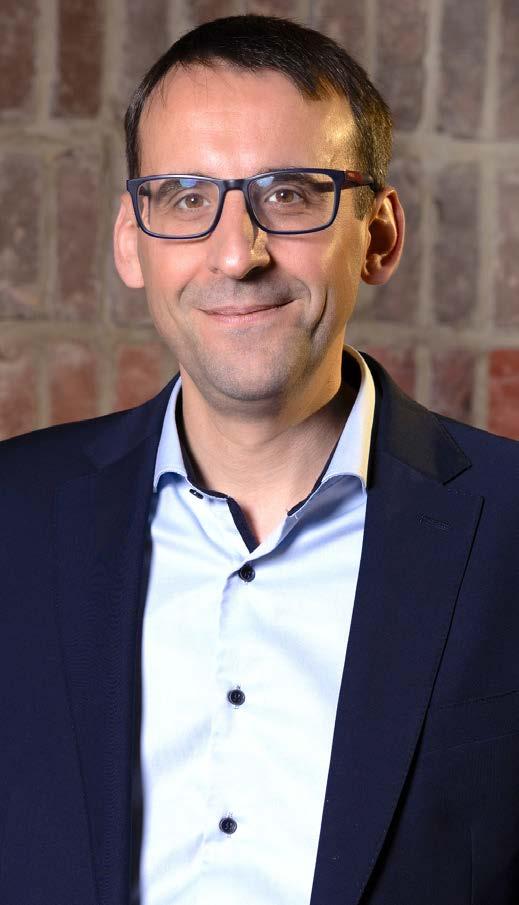
of visiting the Creative Digital Technology Hub in St Malachy’s College in North Belfast where we saw kids do just these things. While the college leadership should be commended for securing the charitable and philanthropic funds to build the hub, they should not have needed to. Government needs to step up and ensure the funds are there to build and maintain such facilities in all schools. Not in 6-8 years as proposed in the Independent Review of Education but now. Having a functioning and stable NI Executive in place would also
The technical fluency fostered by coding and exposure to cutting-edge concepts like AI, fintech and cybersecurity will become essential for navigating an evolving job market. But beyond technical prowess, the critical thinking, creativity, and collaborative skills nurtured through TechTeach and similar initiatives will be the true differentiators. These are the traits that will allow our kids to rise above the machines, to become the business analysts, problem solvers, innovators, and leaders who will define the professions of the future, not simply adapt to them. In an increasingly automated world, these non-automatable skills will be the ultimate currency, ensuring that our young people thrive in a landscape transformed by technology, rather than be defined by it.
in supporting teachers in the delivery of lessons in a way that is consistent and more co-ordinated. That investment needs to ensure that quality and equal provision is delivered in all schools from Belleek to Ballycastle, Newry to Newbuildings and from Coleraine to Crossmaglen.
The "Software Skills for a 10x Economy" report highlights the immense potential of our software industry to drive economic growth and societal progress. Accounting for productivity increases enabled by AI and cloud infrastructure I believe that the software industry could increase headcount by over 50% whilst increasing GVA by 100% enabling it to employ 34,000 people contributing £3.4 billion to the regional economy by 2034.
be helpful in this regard…
While AI promises advancements and efficiencies across various fields, it also presents the potential for automation to reshape the professional landscape. For young people aspiring to a broad range of careers that are currently the mainstay of the Northern Ireland economy and inward investment, equipping themselves with the skills discussed here isn't simply about embracing the future; it's about building a hedge against this potential displacement.
Of course, this transformation requires a collaborative effort. The software industry, educators, policymakers, and parents must all work together to create an education system that nurtures the tech talent of tomorrow. We need curriculum updates that reflect the realities of the 21st century, investment in teacher recruitment, training, development, and retention, as well as access to technology and resources for all students, regardless of background. Timetabling of computing subjects need area and regional co-ordination. This will enable industry practitioners to leverage technology
Let's stop merely preparing for the impact of technology and start equipping our children to build the future. By fostering a generation of tech-savvy creators and problem solvers, we can ensure that Northern Ireland's software industry not only thrives but leads the way in building a more innovative, prosperous, and equitable world.
But unlocking this potential requires a workforce equipped with the skills and mindset to build the software solutions of the future. We need to prepare our kids not just to adapt to change, but to be the architects of it.
Skills shortages.
It’s a phrase I hear frequently in conversations with employers and business leaders but what does it actually mean?
The recent Northern Ireland Skills Survey (released in Dec 2023) made for a sobering read. Over a fifth of employers had at least one vacancy which is impacting 96% of employers, most commonly increasing workload for other staff. Employers are struggling to find the right people which in turn is impacting current staff and growth potential.
Those statistics were in my mind when I read that student loan costs are set to balloon to £10bn a year. In the article, the Institute for Fiscal Studies said that the UK Government could expect to make a loss on all (yes, all!) student loans, regardless of whether they were repaid in full or not. And let’s not forget, for the lives behind those statistics, we have thousands of graduates shouldering student debt they’ll never be able to repay.
In short, the current system is costing us all.
So, what’s the solution? I would suggest a seismic shift in how we think about
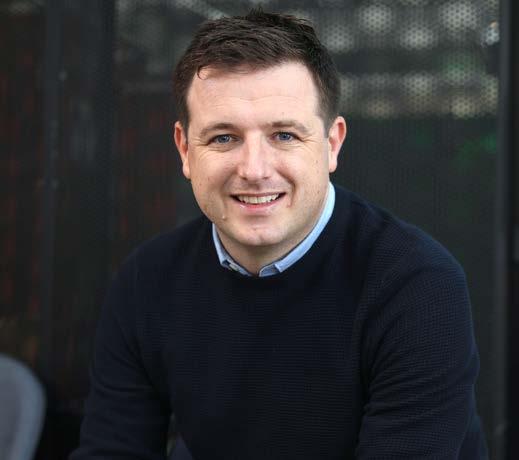
- and crucially, how we tangibly connect - work and education.
I’ve long been an advocate of apprenticeships and the benefits they bring to all involved. I’m involved in this space because I see the value it brings to the economy and society.
For employers it’s not just about finding talent, it’s part of better retention, moulding early talent to suit the needs of the company and encouraging a culture of mentoring and lifelong learning. Furthermore, it feeds into better diversity as it allows employers to draw people from a wider talent pool. For apprentices, it’s about a job from the start, continued education, dedicated mentoring and no student fees.
So why aren’t more employers embracing apprenticeships? I think there are two fundamental – and related - reasons. Firstly, many don’t know where to start and, secondly, the early talent landscape feels complex and siloed. For a lot of busy business leaders and HR professionals, they have neither the headspace nor the time to navigate what often feels like a jumble sale.
The reason I founded Workplus was to make the early talent space place easier for everyone and create a platform which enabled cohesion, collaboration and connection. I don't believe an 18-year-old, neckdeep in exams, should have to make numerous,
cumbersome applications to various apprenticeship opportunities. On the other side, I don’t want to see brilliant HR professionals feel so confused about the early talent space that they simply stick to how they’ve always recruited.
For this early talent space to be easier, we must have a user-centred and deeply collaborative approach.
We live and breathe usercentred services – think booking.com, Amazon and AirBnB, to name but a few. To truly transform the early talent space, we need to adopt this usercentred approach, both for employers as well as for young people and career changers.
Those user-centred services are deeply collaborative by nature – bringing together two distinct audiences, making it easier to connect and resulting in benefits neither could achieve by themselves.
If we want to tackle the skills challenge head-on and transform the early talent space for the betterment of employers and our people, we need to adopt a user-centred and deeply collaborative mindset. I’m not saying it will be easy, but I’m confident it would be worth it.


Together, we make possible.
The state-of-the art network in our new Belfast campus sets a new gold standard which is being rolled out to all our campuses. eir evo’s design & delivery approach has been crucial to its success.
As a trusted partner in Cloud, Networking, Communications, IT or Cyber Security, eir evo goes the extra mile... Visit eirevo.co.uk to learn more.




 Terence Nicholl Head of Infrastructure & Operations, Ulster University.
Terence Nicholl Head of Infrastructure & Operations, Ulster University.

Sync NI is Northern Ireland’s leading technology-focused, multi-channel media platform combining Print, Digital, and Social Media to reach a captive audience of over 75,0000 local IT professionals and tech enthusiasts.